#like. i hate reducing characters to their Jobs or Personas and i try to really flesh them out in my head
Text
was talking to my partner the other day about how severus doesn't seem like a music guy and it makes me so sad
#severus snape#hp fandom#like. i hate reducing characters to their Jobs or Personas and i try to really flesh them out in my head#trying to imagine snape naming a song he enjoys to anyone is nigh impossible#so we came up with the solution that he's a fan of one specific station on the radio#Gloomy.#and he isn't aware of punk at all until he hears sirius playing it loudly#okay goodnight#send me asks....iwanns talk about severus:(
4 notes
·
View notes
Note
About SnK/AoT: What do you think of Ymir as a character? Not the founder Ymir (is this how is she called in English? Idk)
Like, I really started to like her character during the second season, the one that isn't "marry me Christa" all the time, and I think she was outed too soon from the cast- like, I would have loved to see her bonding with Historia further now that the two of them got even closer. So I would like to know what do you think about her and her bond with Historia (outside shipping and all that drama related to it)
Sorry if you already talked about it in the past!
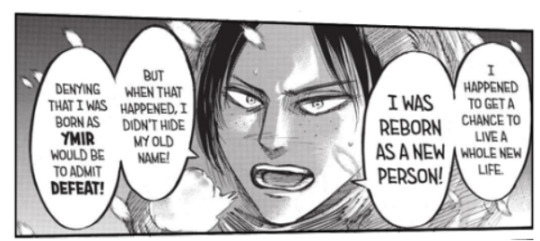
I think she was a good character but I completely agree with you that she got offed a bit too soon. Or at least, Isayama should have confirmed her death earlier so people wouldn't have had hope for her return. I also hate how Isayama just didn't mention her at all after her letter was delivered (aside from showing small panels from someone's memories) and also reduced her to that hair sniffing joke.
She's a very refreshing female character. Very rough around the edges, not feminine at all, and very blunt. Her character is meant to enhance Historia's character, so she can leave the Krista identity behind and become Historia. This is why it's kind of funny to me when people who like Ymir hate Historia.
However, unlike how many theorized back in the days, she wasn't anyone big, but just a normal orphan girl with an unfortunate past who wanted to protect the person she loved. She had no grand goals like Eren/Zeke or ties to royalty like Historia or anything like that.

When Ymir is first introduced, her behavior is very harsh, but it's also subtly pointed out that it's a way for her to cope. In the first arc, we don't really know much about these two characters yet, aside from the fact they are always shown hanging out together, and that Ymir s the mean one and Krista is the nice one.

After the initial first impressions we are shown a flashback where Ymir approaches Krista about her helpful behaviour. There are already hints how she sees through her facade. But the story will come back to this later. Ymir seems harsh, but she has that tough love persona, which will become more clear later. She is always looking out for Krista/Historia. She's basically a tsundere who hides her feelings behind harsh exterior. Everytime the two are shown in other scenes, they are together. The build up is very good.
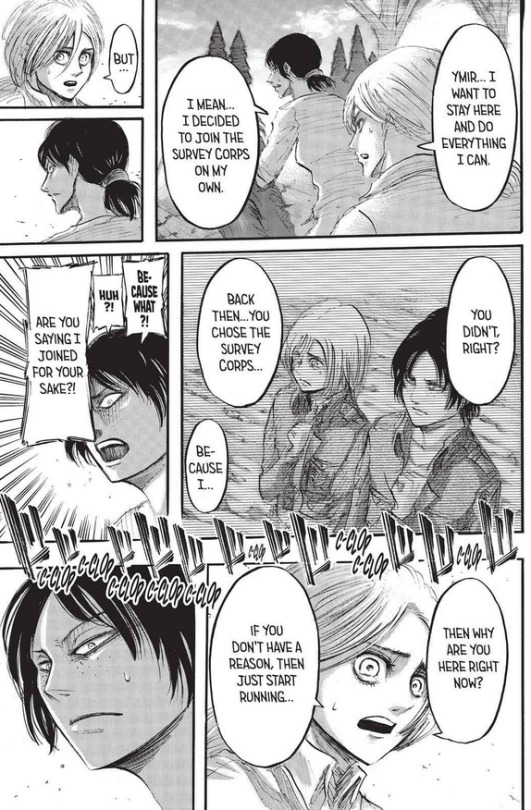
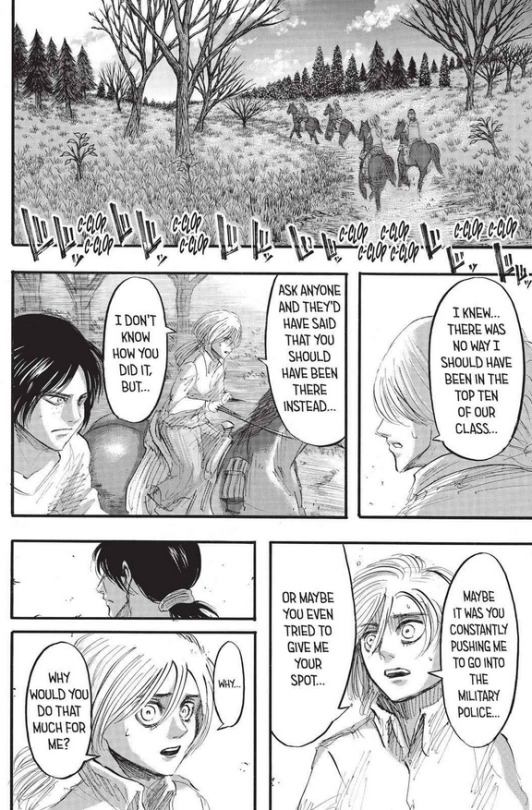
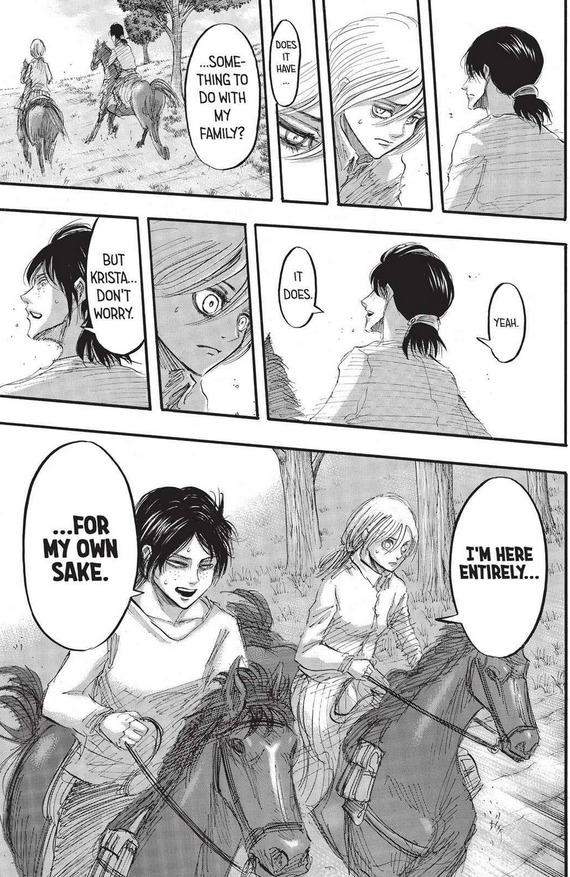
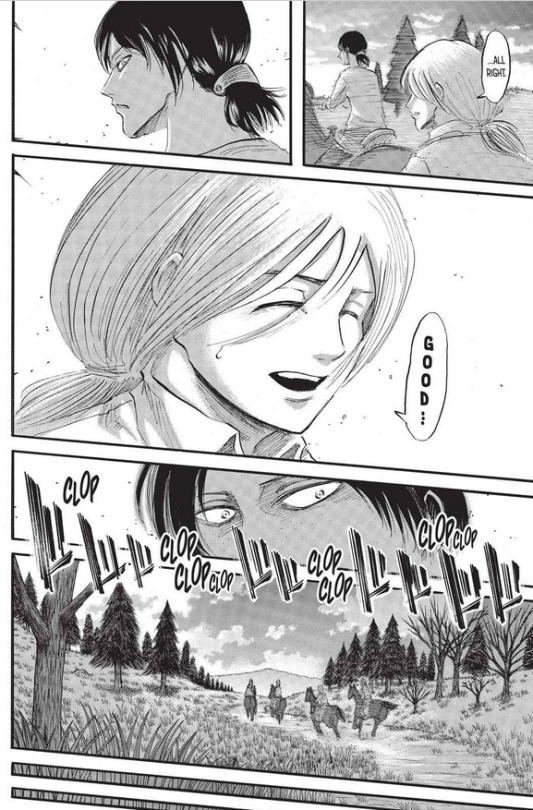
In Clash of the titans arc the two become relevant to the plot because Krista holds the key to the secrets of the walls, and Ymir's name is the same as the one the talking titan uttered. Of course, we will later find out the talking titan in Ilse's story used to be a human who was part of the cult Ymir was in and mistook Ilse for Ymir due to her brown hair and freckles.

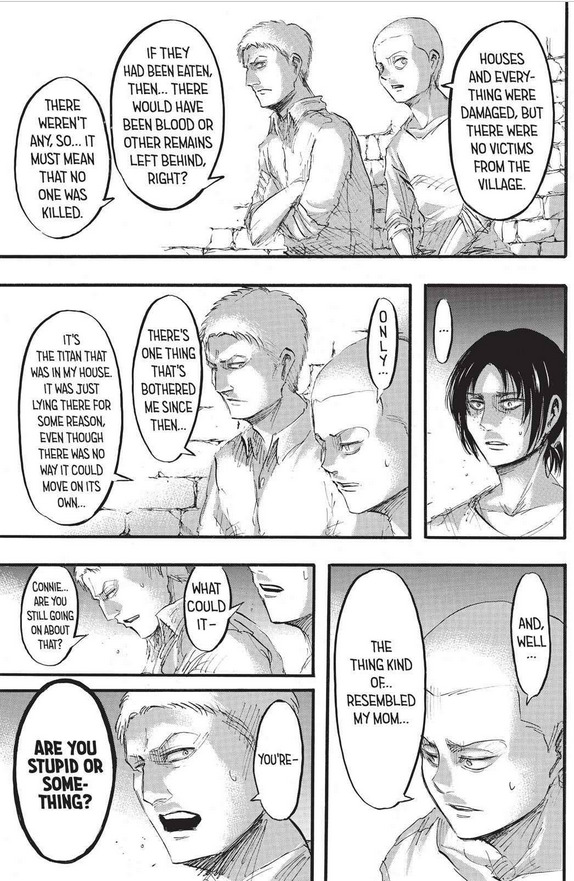
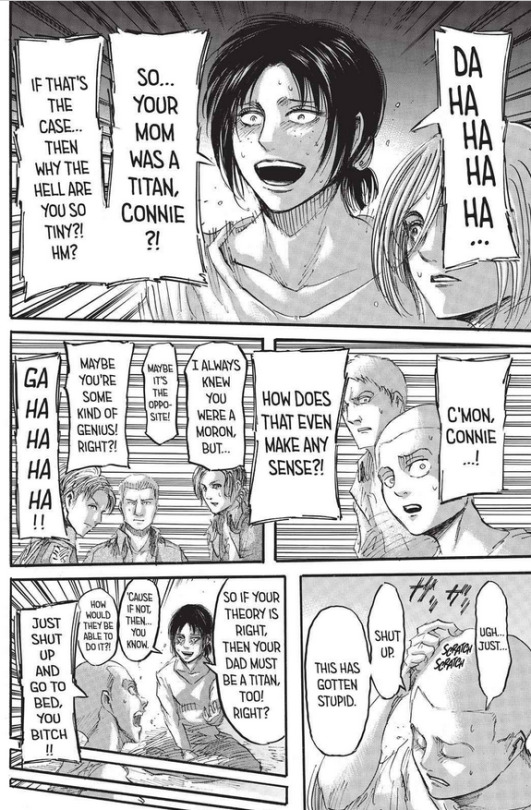
We (as in the readers who understand) find out more about Ymir's personality and how she cares for others when she tries to distract Connie from thinking about his family's faith, or when she is reprimanding Sasha for trying to please others, telling her to just be herself.. She's an easily misunderstood character due to the way she behaves. It was frustrating to watch so many anime onlies misunderstand her character.
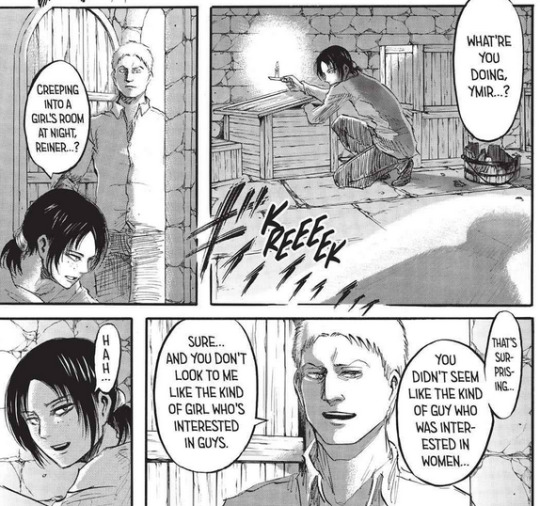
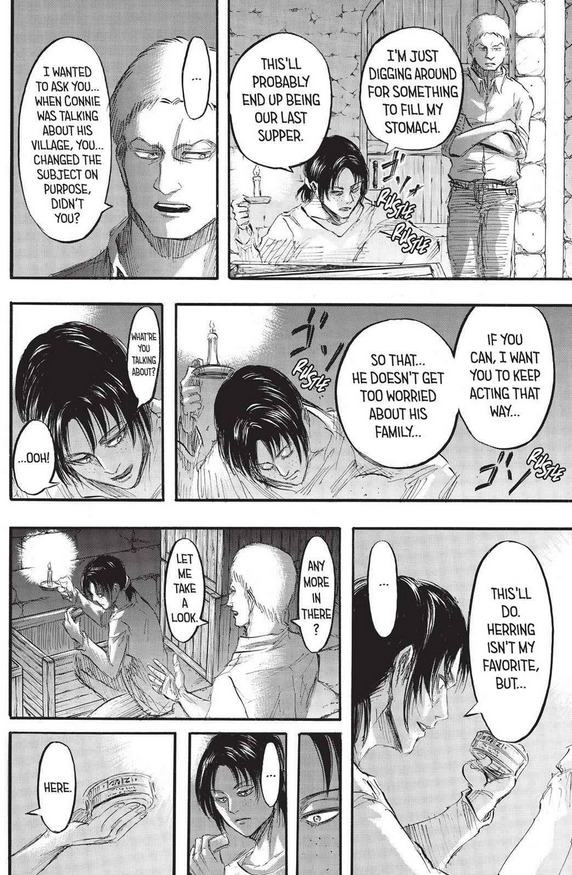
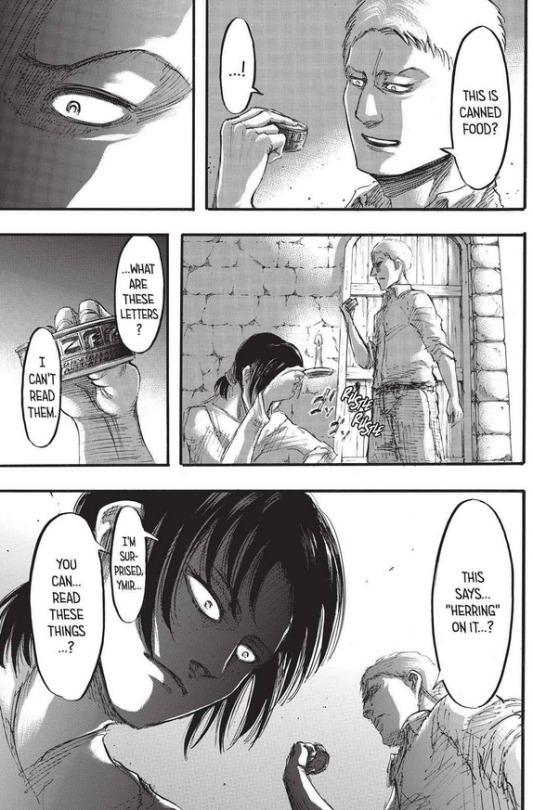
In this short moment, Isayama tells us Ymir's sexuality as well as the fact she's not from the walls. Very nice job.

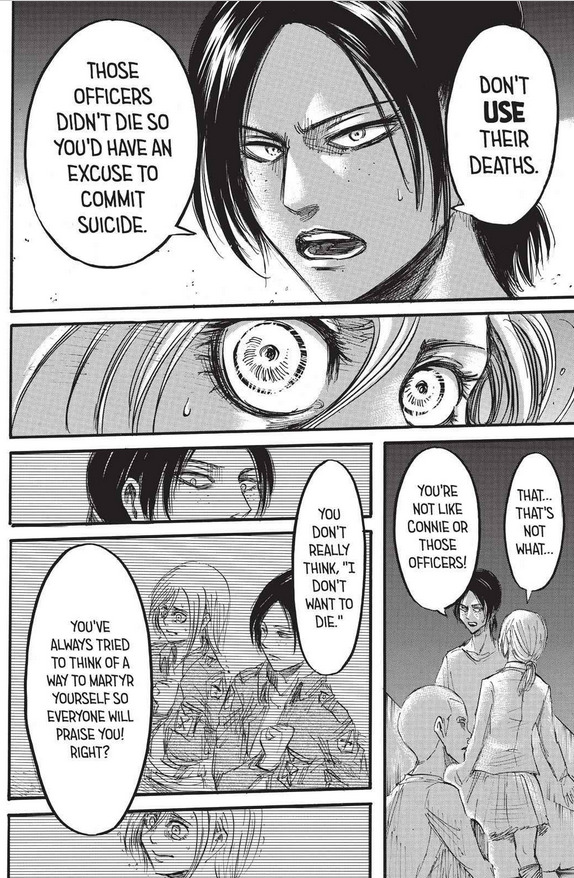

The way Isayama revealed of Ymir and Krista/Historia's characters was very well written. A lot of people didn't expect them to be that relevant.
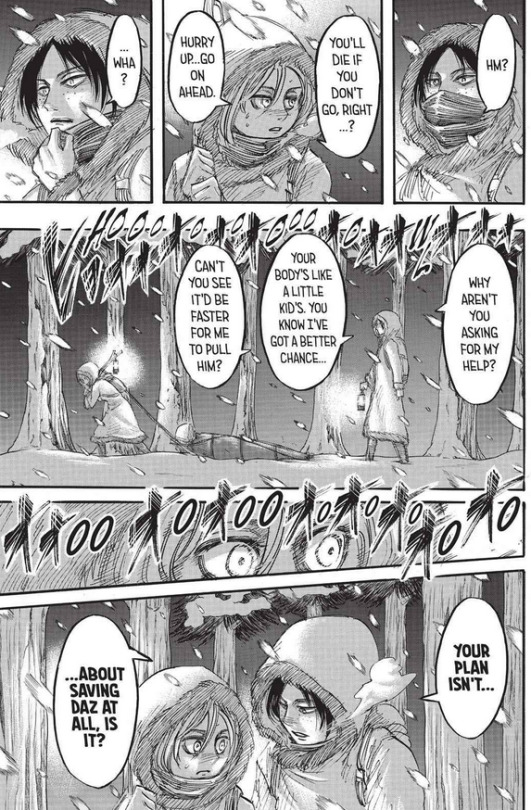

Isayama used Ymir's screentime in general very well. I'm not surprised people fell in love with these two's dynamic immediately. The coming together of two people with tragic pasts and one of them helping the other conquer her inner demons was well done.
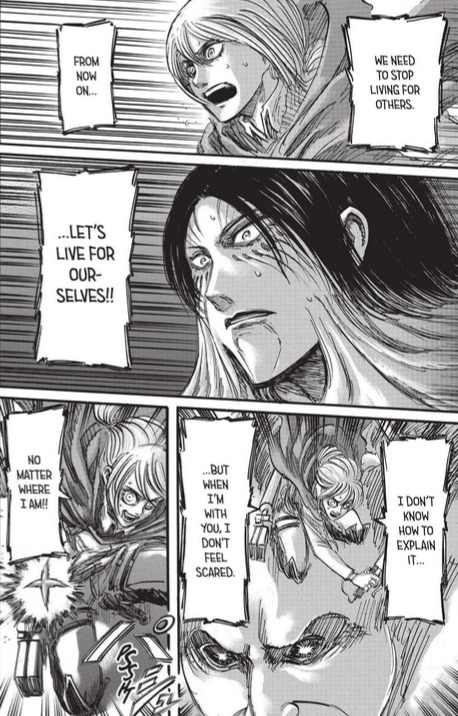
It's wonderful how nicely these two different girls meshed together. Isayama was shining when writing them in Clash of the titans.
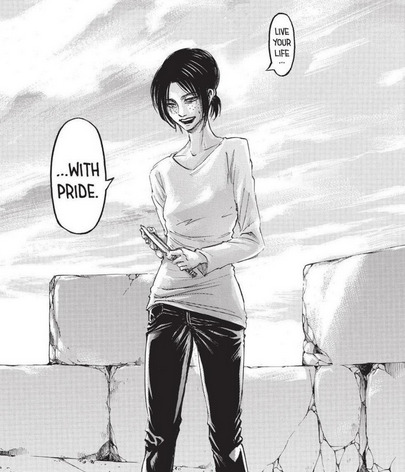
Ymir's influence carries on even after her death, because it's both due to her and Eren's words why Historia rejects the serum in the Reiss cave.
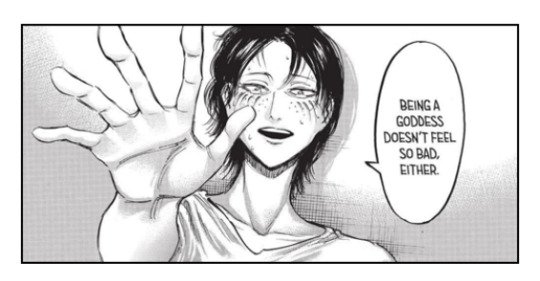
I also like that this was the last panel of her in present time. The focus was on her, not on Reiner and Bertolt.
But, the end of her character writing was slobby and rushed. It left a lot of people confused by her actions. Why would she do what she did? To give Marley a weapon? To the people who try to kill the people of Paradis, including Historia? Even with possible guilt or empathy towards Reiner and Bertolt, it just doesn't really fit her character, in my opinion. Isayama should have at least shown us a believable transition on how this happened. But he kind of just sped through it. And Ymir getting an off-screen death and only a quick mention by Porco is another thing that frustrated me a lot.
While Isayama used to write both Ymir and Historia so well, he really dropped the ball with them in the last arc. But he did so with many other characters too. It's sad. The bad ending has kinda soured my feelings for snk but I try to take the good parts of it and pretend the ending doesn't exist. Ymir was still overall a good character.
8 notes
·
View notes
Note
Here is the 2012 Detail Magazine interview with chris evans:
The Avengers' Chris Evans: Just Your Average Beer-Swilling, Babe-Loving Buddhist
The 30-year-old Bud Light-chugging, Beantown-bred star of The Avengers is widely perceived as the ultimate guy's guy. But beneath the bro persona lies a serious student of Buddhism, an unrepentant song-and-dance man, and a guy who talks to his mom about sex. And farts.
By Adam Sachs,
Photographs by Norman Jean Roy
May 2012 Issue
"Should we just kill him and bury his body?" Chris Evans is stage whispering into the impassive blinking light of my digital recorder.
"Chris!" shouts his mother, her tone a familiar-to-anyone-with-a-mother mix of coddling and concern. "Don't say that! What if something happened?"
We're at Evans' apartment, an expansive but not overly tricked-out bachelor-pad-ish loft in a semi-industrial nowheresville part of Boston, hard by Chinatown, near an area sometimes called the Combat Zone. Evans has a fuzzy, floppy, slept-in-his-clothes aspect that'd be nearly unrecognizable if you knew him only by the upright, spit-polished bearing of the onscreen hero. His dog, East, a sweet and slobbery American bulldog, is spread out on a couch in front of the TV. The shelves of his fridge are neatly stacked with much of the world's supply of Bud Light in cans and little else.
On the counter sit a few buckets of muscle-making whey-protein powder that belong to Evans' roommate, Zach Jarvis, an old pal who sometimes tags along on set as a paid "assistant" and a personal trainer who bulked Evans up for his role as the super-ripped patriot in last summer's blockbuster Captain America: The First Avenger. A giant clock on the exposed-brick wall says it's early evening, but Evans operates on his own sense of time. Between gigs, his schedule's all his, which usually translates into long stretches of alone time during the day and longer social nights for the 30-year-old.
"I could just make this . . . disappear," says Josh Peck, another old pal and occasional on-set assistant, in a deadpan mumble, poking at the voice recorder I'd left on the table while I was in the bathroom.
Evans' mom, Lisa, now speaks directly into the microphone: "Don't listen to them—I'm trying to get them not to say these things!"
But not saying things isn't in the Evans DNA. They're an infectiously gregarious clan. Irish-Italians, proud Bostoners, close-knit, and innately theatrical. "We all act, we sing," Evans says. "It was like the fucking von Trapps." Mom was a dancer and now runs a children's theater. First-born Carly directed the family puppet shows and studied theater at NYU. Younger brother Scott has parts on One Life to Live and Law & Order under his belt and lives in Los Angeles full-time—something Evans stopped doing several years back. Rounding out the circle are baby sister Shanna and a pair of "strays" the family brought into their Sudbury, Massachusetts, home: Josh, who went from mowing the lawn to moving in when his folks relocated during his senior year in high school; and Demery, who was Evans' roommate until recently.
"Our house was like a hotel," Evans says. "It was a loony-tunes household. If you got arrested in high school, everyone knew: 'Call Mrs. Evans, she'll bail you out.'"
Growing up, they had a special floor put in the basement where all the kids practiced tap-dancing. The party-ready rec room also had a Ping-Pong table and a separate entrance. This was the house kids in the neighborhood wanted to hang at, and this was the kind of family you wanted to be adopted by. Spend an afternoon listening to them dish old dirt and talk over each other and it's easy to see why. Now they're worried they've said too much, laid bare the tender soul of the actor behind the star-spangled superhero outfit, so there's talk of offing the interviewer. I can hear all this from the bathroom, which, of course, is the point of a good stage whisper.
To be sure, no one's said too much, and the more you're brought into the embrace of this boisterous, funny, shit-slinging, demonstrably loving extended family, the more likable and enviable the whole dynamic is.
Sample exchange from today's lunch of baked ziti at a family-style Italian restaurant:
Mom: When he was a kid, he asked me, 'Mom, will I ever think farting isn't funny?'
Chris: You're throwing me under the bus, Ma! Thank you.
Mom: Well, if a dog farts you still find it funny.
Then, back at the apartment, where Mrs. Evans tries to give me good-natured dirt on her son without freaking him out:
Mom: You always tell me when you think a girl is attractive. You'll call me up so excited. Is that okay to say?
Chris: Nothing wrong with that.
Mom: And can I say all the girls you've brought to the house have been very sweet and wonderful? Of course, those are the ones that make it to the house. It's been a long time, hasn't it?
Chris: Looooong time.
Mom: The last one at our house? Was it six years ago?
Chris: No names, Ma!
Mom: But she knocked it out of the park.
Chris: She got drunk and puked at Auntie Pam's house! And she puked on the way home and she puked at our place.
Mom: And that's when I fell in love with her. Because she was real.
We're operating under a no-names rule, so I'm not asking if it's Jessica Biel who made this memorable first impression. She and Evans were serious for a couple of years. But I don't want to picture lovely Jessica Biel getting sick at Auntie Pam's or in the car or, really, anywhere.
East the bulldog ambles over to the table, begging for food.
"That dog is the love of his life," Mrs. Evans says. "Which tells me he'll be an unbelievable parent, but I don't want him to get married right now." She turns to Chris. "The way you are, I just don't think you're ready."
Some other things I learn about Evans from his mom: He hates going to the gym; he was so wound-up as a kid she'd let him stand during dinner, his legs shaking like caged greyhounds; he suffered weekly "Sunday-night meltdowns" over schoolwork and the angst of the sensitive middle-schooler; after she and his father split and he was making money from acting, he bought her the Sudbury family homestead rather than let her leave it.
Eventually his mom and Josh depart, and Evans and I go to work depleting his stash of Bud Light. It feels like we drink Bud Light and talk for days, because we basically do. I arrived early Friday evening; it's Saturday night now and it'll be sunup Sunday before I sleeplessly make my way to catch a train back to New York City. Somewhere in between we slip free of the gravitational pull of the bachelor pad and there's bottle service at a club and a long walk with entourage in tow back to Evans' apartment, where there is some earnest-yet-surreal group singing, piano playing, and chitchat. Evans is fun to talk to, partly because he's an open, self-mocking guy with an explosive laugh and no apparent need to sleep, and partly because when you cut just below the surface, it's clear he's not quite the dude's dude he sometimes plays onscreen and in TV appearances.
From a distance, Chris Evans the movie star seems a predictable, nearly inevitable piece of successful Hollywood packaging come to market. There's his major-release debut as the dorkily unaware jock Jake in the guilty pleasure Not Another Teen Movie (in one memorable scene, Evans has whipped cream on his chest and a banana up his ass). The female-friendly hunk appeal—his character in The Nanny Diaries is named simply Harvard Hottie—is balanced by a kind of casual-Friday, I'm-from-Boston regular-dudeness. Following the siren song of comic-book cash, he was the Human Torch in two Fantastic Four films. As with scrawny Steve Rogers, the Captain America suit beefed up his stature as a formidable screen presence, a bankable leading man, all of which leads us to The Avengers, this season's megabudget, megawatt ensemble in which he stars alongside Scarlett Johansson, Mark Ruffalo, Robert Downey Jr., and Chris Hemsworth.
It all feels inevitable—and yet it nearly didn't happen. Evans repeatedly turned down the Captain America role, fearing he'd be locked into what was originally a nine-picture deal. He was shooting Puncture, about a drug-addicted lawyer, at the time. Most actors doing small-budget legal dramas would jump at the chance to play the lead in a Marvel franchise, but Evans saw a decade of his life flash before his eyes.
What he remembers thinking is this: "What if the movie comes out and it's a success and I just reject all of this? What if I want to move to the fucking woods?"
By "the woods," he doesn't mean a quiet life away from the spotlight, some general metaphorical life escape route. He means the actual woods. "For a long time all I wanted for Christmas were books about outdoor survival," he says. "I was convinced that I was going to move to the woods. I camped a lot, I took classes. At 18, I told myself if I don't live in the woods by the time I'm 25, I have failed."
Evans has described his hesitation at signing on for Captain America. Usually he talks about the time commitment, the loss of what remained of his relative anonymity. On the junkets for the movie, he was open about needing therapy after the studio reduced the deal to six movies and he took the leap. What he doesn't usually mention is that he was racked with anxiety before the job came up.
"I get very nervous," Evans explains. "I shit the bed if I have to present something on stage or if I'm doing press. Because it's just you." He's been known to walk out of press conferences, to freeze up and go silent during the kind of relaxed-yet-high-stakes meetings an actor of his stature is expected to attend: "Do you know how badly I audition? Fifty percent of the time I have to walk out of the room. I'm naturally very pale, so I turn red and sweat. And I have to literally walk out. Sometimes mid-audition. You start having these conversations in your brain. 'Chris, don't do this. Chris, take it easy. You're just sitting in a room with a person saying some words, this isn't life. And you're letting this affect you? Shame on you.'"
Shades of "Sunday-night meltdowns." Luckily the nerves never follow him to the set. "You do your neuroses beforehand, so when they yell 'Action' you can be present," he says.
Okay, there was one on-set panic attack—while Evans was shooting Puncture. "We were getting ready to do a court scene in front of a bunch of people, and I don't know what happened," he says. "It's just your brain playing games with you. 'Hey, you know how we sometimes freak out? What if we did it right now?'"
One of the people who advised Evans to take the Captain America role was his eventual Avengers costar Robert Downey Jr. "I'd seen him around," Downey says. "We share an agent. I like to spend a lot of my free time talking to my agent about his other clients—I just had a feeling about him."
What he told Evans was: This puppy is going to be big, and when it is you're going to get to make the movies you want to make. "In the marathon obstacle course of a career," Downey says, "it's just good to have all the stats on paper for why you're not only a team player but also why it makes sense to support you in the projects you want to do—because you've made so much damned money for the studio."
There's also the fact that Evans had a chance to sign on for something likely to be a kind of watershed moment in the comic-book fascination of our time. "I do think The Avengers is the crescendo of this superhero phase in entertainment—except of course for Iron Man 3," Downey says. "It'll take a lot of innovation to keep it alive after this."
Captain America is the only person left who was truly close to Howard Stark, father of Tony Stark (a.k.a. Iron Man), which meant that Evans' and Downey's story lines are closely linked, and in the course of doing a lot of scenes together, they got to be pals. Downey diagnoses his friend with what he terms "low-grade red-carpet anxiety disorder."
"He just hates the game-show aspect of doing PR," Downey says. "Obviously there's pressure for anyone in this transition he's in. But he will easily triple that pressure to make sure he's not being lazy. That's why I respect the guy. I wouldn't necessarily want to be in his skin. But his motives are pure. He just needs to drink some red-carpet chamomile."
"The majority of the world is empty space," Chris Evans says, watching me as if my brain might explode on hearing this news—or like he might have to fight me if I try to contradict him. We're back at his apartment after a cigarette run through the Combat Zone.
"Empty space!" he says again, slapping the table and sort of yelling. Then, in a slow, breathy whisper, he repeats: "Empty space, empty space. All that we see in the world, the life, the animals, plants, people, it's all empty space. That's amazing!" He slaps the table again. "You want another beer? Gotta be Bud Light. Get dirty—you're in Boston. Okay, organize your thoughts. I gotta take a piss . . ."
My thoughts are this: That this guy who is hugging his dog and talking to me about space and mortality and the trouble with Boston girls who believe crazy gossip about him—this is not the guy I expected to meet. I figured he'd be a meatball. Though, truthfully, I'd never called anyone a meatball until Evans turned me on to the put-down. As in: "My sister Shanna dates meatballs." And, more to the point: "When I do interviews, I'd rather just be the beer-drinking dude from Boston and not get into the complex shit, because I don't want every meatball saying, 'So hey, whaddyathink about Buddhism?'"
At 17, Evans came across a copy of Hermann Hesse's Siddhartha and began his spiritual questing. It's a path of study and struggle that, he says, defines his true purpose in life. "I love acting. It's my playground, it lets me explore. But my happiness in this world, my level of peace, is never going to be dictated by acting," he says. "My goal in life is to detach from the egoic mind. Do you know anything about Eastern philosophy?"
I sip some Bud Light and shake my head sheepishly. "They talk about the egoic mind, the part of you that's self-aware, the watcher, the person you think is driving this machine," he says. "And that separation from self and mind is the root of suffering. There are ways of retraining the way you think. This isn't really supported in Western society, which is focused on 'Go get it, earn it, win it, marry it.'"
Scarlett Johansson says that one of the things she appreciates about Evans is how he steers clear of industry chat when they see each other. "Basically every actor," she says, "including myself, when we finish a job we're like, 'Well, that's it for me. Had a good run. Put me out to pasture.' But Chris doesn't strike me as someone who frets about the next job." The two met on the set of The Perfect Score when they were teenagers and have stayed close; The Avengers is their third movie together. "He has this obviously masculine presence—a dude's dude—and we're used to seeing him play heroic characters," Johansson says, "but he's also surprisingly sensitive. He has close female friends, and you can talk to him about anything. Plus there's that secret song-and-dance, jazz-hands side of Chris. I feel like he grew up with the Partridge Family. He'd be just as happy doing Guys and Dolls as he would Captain America 2."
East needs to do his business, so Evans and I take him up to the roof deck. Evans bought this apartment in 2010 when living in L.A. full-time no longer appealed to him. He came back to stay close to his extended family and the intimate circle of Boston pals he's maintained since high school. The move also seems like a pretty clear keep-it-real hedge against the manic ego-stroking distractions of Hollywood.
"I think my daytime person is different than my nighttime person," Evans says. "With my high-school buddies, we drink beer and talk sports and it's great. The kids in my Buddhism class in L.A., they're wildly intelligent, and I love being around them, but they're not talking about the Celtics. And that's part of me. It's a strange dichotomy. I don't mind being a certain way with some people and having this other piece of me that's just for me."
I asked Downey about Evans' outward regular-Joe persona. "It's complete horseshit," Downey says. "There's an inherent street-smart intelligence there. I don't think he tries to hide it. But he's much more evolved and much more culturally aware than he lets on."
Perhaps the meatball and the meditation can coexist. We argue about our egoic brains and the tao of Boston girls. "I love wet hair and sweatpants," he says in their defense. "I like sneakers and ponytails. I like girls who aren't so la-di-da. L.A. is so la-di-da. I like Boston girls who shit on me. Not literally. Girls who give me a hard time, bust my chops a little."
The chief buster of Evans' chops is, of course, Evans himself. "The problem is, the brain I'm using to dissect this world is a brain formed by it," he says. "We're born into confusion, and we get the blessing of letting go of it." Then he adds: "I think this shit by day. And then night comes and it's like, 'Fuck it, let's drink.'"
And so we do. It's getting late. Again. We should have eaten dinner, but Evans sometimes forgets to eat: "If I could just take a pill to make me full forever, I wouldn't think twice."
We talk about his dog and camping with his dog and why he loves being alone more than almost anything except maybe not being alone. "I swear to God, if you saw me when I am by myself in the woods, I'm a lunatic," he says. "I sing, I dance. I do crazy shit."
Evans' unflagging, all-encompassing enthusiasm is impressive, itself a kind of social intelligence. "If you want to have a good conversation with him, don't talk about the fact that he's famous" was the advice I got from Mark Kassen, who codirected Puncture. "He's a blast, a guy who can hang. For quite a long time. Many hours in a row."
I've stopped looking at the clock. We've stopped talking philosophy and moved into more emotional territory. He asks questions about my 9-month-old son, and then Captain America gets teary when I talk about the wonder of his birth. "I weep at everything," he says. "I emote. I love things so much—I just never want to dilute that."
He talks about how close he feels to his family, how open they all are with each other. About everything. All the time. "The first time I had sex," he says, "I raced home and was like, 'Mom, I just had sex! Where's the clit?'"
Wait, I ask—did she ever tell you?
"Still don't know where it is, man," he says, then breaks into a smile composed of equal parts shit-eating grin and inner peace. "I just don't know. Make some movies, you don't have to know…"
Here is the 2012 Detail Magazine interview with chris evans:
The Avengers' Chris Evans: Just Your Average Beer-Swilling, Babe-Loving Buddhist
The 30-year-old Bud Light-chugging, Beantown-bred star of The Avengers is widely perceived as the ultimate guy's guy. But beneath the bro persona lies a serious student of Buddhism, an unrepentant song-and-dance man, and a guy who talks to his mom about sex. And farts.
By Adam Sachs,
Photographs by Norman Jean Roy
May 2012 Issue
"Should we just kill him and bury his body?" Chris Evans is stage whispering into the impassive blinking light of my digital recorder.
"Chris!" shouts his mother, her tone a familiar-to-anyone-with-a-mother mix of coddling and concern. "Don't say that! What if something happened?"
We're at Evans' apartment, an expansive but not overly tricked-out bachelor-pad-ish loft in a semi-industrial nowheresville part of Boston, hard by Chinatown, near an area sometimes called the Combat Zone. Evans has a fuzzy, floppy, slept-in-his-clothes aspect that'd be nearly unrecognizable if you knew him only by the upright, spit-polished bearing of the onscreen hero. His dog, East, a sweet and slobbery American bulldog, is spread out on a couch in front of the TV. The shelves of his fridge are neatly stacked with much of the world's supply of Bud Light in cans and little else.
On the counter sit a few buckets of muscle-making whey-protein powder that belong to Evans' roommate, Zach Jarvis, an old pal who sometimes tags along on set as a paid "assistant" and a personal trainer who bulked Evans up for his role as the super-ripped patriot in last summer's blockbuster Captain America: The First Avenger. A giant clock on the exposed-brick wall says it's early evening, but Evans operates on his own sense of time. Between gigs, his schedule's all his, which usually translates into long stretches of alone time during the day and longer social nights for the 30-year-old.
"I could just make this . . . disappear," says Josh Peck, another old pal and occasional on-set assistant, in a deadpan mumble, poking at the voice recorder I'd left on the table while I was in the bathroom.
Evans' mom, Lisa, now speaks directly into the microphone: "Don't listen to them—I'm trying to get them not to say these things!"
But not saying things isn't in the Evans DNA. They're an infectiously gregarious clan. Irish-Italians, proud Bostoners, close-knit, and innately theatrical. "We all act, we sing," Evans says. "It was like the fucking von Trapps." Mom was a dancer and now runs a children's theater. First-born Carly directed the family puppet shows and studied theater at NYU. Younger brother Scott has parts on One Life to Live and Law & Order under his belt and lives in Los Angeles full-time—something Evans stopped doing several years back. Rounding out the circle are baby sister Shanna and a pair of "strays" the family brought into their Sudbury, Massachusetts, home: Josh, who went from mowing the lawn to moving in when his folks relocated during his senior year in high school; and Demery, who was Evans' roommate until recently.
"Our house was like a hotel," Evans says. "It was a loony-tunes household. If you got arrested in high school, everyone knew: 'Call Mrs. Evans, she'll bail you out.'"
Growing up, they had a special floor put in the basement where all the kids practiced tap-dancing. The party-ready rec room also had a Ping-Pong table and a separate entrance. This was the house kids in the neighborhood wanted to hang at, and this was the kind of family you wanted to be adopted by. Spend an afternoon listening to them dish old dirt and talk over each other and it's easy to see why. Now they're worried they've said too much, laid bare the tender soul of the actor behind the star-spangled superhero outfit, so there's talk of offing the interviewer. I can hear all this from the bathroom, which, of course, is the point of a good stage whisper.
To be sure, no one's said too much, and the more you're brought into the embrace of this boisterous, funny, shit-slinging, demonstrably loving extended family, the more likable and enviable the whole dynamic is.
Sample exchange from today's lunch of baked ziti at a family-style Italian restaurant:
Mom: When he was a kid, he asked me, 'Mom, will I ever think farting isn't funny?'
Chris: You're throwing me under the bus, Ma! Thank you.
Mom: Well, if a dog farts you still find it funny.
Then, back at the apartment, where Mrs. Evans tries to give me good-natured dirt on her son without freaking him out:
Mom: You always tell me when you think a girl is attractive. You'll call me up so excited. Is that okay to say?
Chris: Nothing wrong with that.
Mom: And can I say all the girls you've brought to the house have been very sweet and wonderful? Of course, those are the ones that make it to the house. It's been a long time, hasn't it?
Chris: Looooong time.
Mom: The last one at our house? Was it six years ago?
Chris: No names, Ma!
Mom: But she knocked it out of the park.
Chris: She got drunk and puked at Auntie Pam's house! And she puked on the way home and she puked at our place.
Mom: And that's when I fell in love with her. Because she was real.
We're operating under a no-names rule, so I'm not asking if it's Jessica Biel who made this memorable first impression. She and Evans were serious for a couple of years. But I don't want to picture lovely Jessica Biel getting sick at Auntie Pam's or in the car or, really, anywhere.
East the bulldog ambles over to the table, begging for food.
"That dog is the love of his life," Mrs. Evans says. "Which tells me he'll be an unbelievable parent, but I don't want him to get married right now." She turns to Chris. "The way you are, I just don't think you're ready."
Some other things I learn about Evans from his mom: He hates going to the gym; he was so wound-up as a kid she'd let him stand during dinner, his legs shaking like caged greyhounds; he suffered weekly "Sunday-night meltdowns" over schoolwork and the angst of the sensitive middle-schooler; after she and his father split and he was making money from acting, he bought her the Sudbury family homestead rather than let her leave it.
Eventually his mom and Josh depart, and Evans and I go to work depleting his stash of Bud Light. It feels like we drink Bud Light and talk for days, because we basically do. I arrived early Friday evening; it's Saturday night now and it'll be sunup Sunday before I sleeplessly make my way to catch a train back to New York City. Somewhere in between we slip free of the gravitational pull of the bachelor pad and there's bottle service at a club and a long walk with entourage in tow back to Evans' apartment, where there is some earnest-yet-surreal group singing, piano playing, and chitchat. Evans is fun to talk to, partly because he's an open, self-mocking guy with an explosive laugh and no apparent need to sleep, and partly because when you cut just below the surface, it's clear he's not quite the dude's dude he sometimes plays onscreen and in TV appearances.
From a distance, Chris Evans the movie star seems a predictable, nearly inevitable piece of successful Hollywood packaging come to market. There's his major-release debut as the dorkily unaware jock Jake in the guilty pleasure Not Another Teen Movie (in one memorable scene, Evans has whipped cream on his chest and a banana up his ass). The female-friendly hunk appeal—his character in The Nanny Diaries is named simply Harvard Hottie—is balanced by a kind of casual-Friday, I'm-from-Boston regular-dudeness. Following the siren song of comic-book cash, he was the Human Torch in two Fantastic Four films. As with scrawny Steve Rogers, the Captain America suit beefed up his stature as a formidable screen presence, a bankable leading man, all of which leads us to The Avengers, this season's megabudget, megawatt ensemble in which he stars alongside Scarlett Johansson, Mark Ruffalo, Robert Downey Jr., and Chris Hemsworth.
It all feels inevitable—and yet it nearly didn't happen. Evans repeatedly turned down the Captain America role, fearing he'd be locked into what was originally a nine-picture deal. He was shooting Puncture, about a drug-addicted lawyer, at the time. Most actors doing small-budget legal dramas would jump at the chance to play the lead in a Marvel franchise, but Evans saw a decade of his life flash before his eyes.
What he remembers thinking is this: "What if the movie comes out and it's a success and I just reject all of this? What if I want to move to the fucking woods?"
By "the woods," he doesn't mean a quiet life away from the spotlight, some general metaphorical life escape route. He means the actual woods. "For a long time all I wanted for Christmas were books about outdoor survival," he says. "I was convinced that I was going to move to the woods. I camped a lot, I took classes. At 18, I told myself if I don't live in the woods by the time I'm 25, I have failed."
Evans has described his hesitation at signing on for Captain America. Usually he talks about the time commitment, the loss of what remained of his relative anonymity. On the junkets for the movie, he was open about needing therapy after the studio reduced the deal to six movies and he took the leap. What he doesn't usually mention is that he was racked with anxiety before the job came up.
"I get very nervous," Evans explains. "I shit the bed if I have to present something on stage or if I'm doing press. Because it's just you." He's been known to walk out of press conferences, to freeze up and go silent during the kind of relaxed-yet-high-stakes meetings an actor of his stature is expected to attend: "Do you know how badly I audition? Fifty percent of the time I have to walk out of the room. I'm naturally very pale, so I turn red and sweat. And I have to literally walk out. Sometimes mid-audition. You start having these conversations in your brain. 'Chris, don't do this. Chris, take it easy. You're just sitting in a room with a person saying some words, this isn't life. And you're letting this affect you? Shame on you.'"
Shades of "Sunday-night meltdowns." Luckily the nerves never follow him to the set. "You do your neuroses beforehand, so when they yell 'Action' you can be present," he says.
Okay, there was one on-set panic attack—while Evans was shooting Puncture. "We were getting ready to do a court scene in front of a bunch of people, and I don't know what happened," he says. "It's just your brain playing games with you. 'Hey, you know how we sometimes freak out? What if we did it right now?'"
One of the people who advised Evans to take the Captain America role was his eventual Avengers costar Robert Downey Jr. "I'd seen him around," Downey says. "We share an agent. I like to spend a lot of my free time talking to my agent about his other clients—I just had a feeling about him."
What he told Evans was: This puppy is going to be big, and when it is you're going to get to make the movies you want to make. "In the marathon obstacle course of a career," Downey says, "it's just good to have all the stats on paper for why you're not only a team player but also why it makes sense to support you in the projects you want to do—because you've made so much damned money for the studio."
There's also the fact that Evans had a chance to sign on for something likely to be a kind of watershed moment in the comic-book fascination of our time. "I do think The Avengers is the crescendo of this superhero phase in entertainment—except of course for Iron Man 3," Downey says. "It'll take a lot of innovation to keep it alive after this."
Captain America is the only person left who was truly close to Howard Stark, father of Tony Stark (a.k.a. Iron Man), which meant that Evans' and Downey's story lines are closely linked, and in the course of doing a lot of scenes together, they got to be pals. Downey diagnoses his friend with what he terms "low-grade red-carpet anxiety disorder."
"He just hates the game-show aspect of doing PR," Downey says. "Obviously there's pressure for anyone in this transition he's in. But he will easily triple that pressure to make sure he's not being lazy. That's why I respect the guy. I wouldn't necessarily want to be in his skin. But his motives are pure. He just needs to drink some red-carpet chamomile."
"The majority of the world is empty space," Chris Evans says, watching me as if my brain might explode on hearing this news—or like he might have to fight me if I try to contradict him. We're back at his apartment after a cigarette run through the Combat Zone.
"Empty space!" he says again, slapping the table and sort of yelling. Then, in a slow, breathy whisper, he repeats: "Empty space, empty space. All that we see in the world, the life, the animals, plants, people, it's all empty space. That's amazing!" He slaps the table again. "You want another beer? Gotta be Bud Light. Get dirty—you're in Boston. Okay, organize your thoughts. I gotta take a piss . . ."
My thoughts are this: That this guy who is hugging his dog and talking to me about space and mortality and the trouble with Boston girls who believe crazy gossip about him—this is not the guy I expected to meet. I figured he'd be a meatball. Though, truthfully, I'd never called anyone a meatball until Evans turned me on to the put-down. As in: "My sister Shanna dates meatballs." And, more to the point: "When I do interviews, I'd rather just be the beer-drinking dude from Boston and not get into the complex shit, because I don't want every meatball saying, 'So hey, whaddyathink about Buddhism?'"
At 17, Evans came across a copy of Hermann Hesse's Siddhartha and began his spiritual questing. It's a path of study and struggle that, he says, defines his true purpose in life. "I love acting. It's my playground, it lets me explore. But my happiness in this world, my level of peace, is never going to be dictated by acting," he says. "My goal in life is to detach from the egoic mind. Do you know anything about Eastern philosophy?"
I sip some Bud Light and shake my head sheepishly. "They talk about the egoic mind, the part of you that's self-aware, the watcher, the person you think is driving this machine," he says. "And that separation from self and mind is the root of suffering. There are ways of retraining the way you think. This isn't really supported in Western society, which is focused on 'Go get it, earn it, win it, marry it.'"
Scarlett Johansson says that one of the things she appreciates about Evans is how he steers clear of industry chat when they see each other. "Basically every actor," she says, "including myself, when we finish a job we're like, 'Well, that's it for me. Had a good run. Put me out to pasture.' But Chris doesn't strike me as someone who frets about the next job." The two met on the set of The Perfect Score when they were teenagers and have stayed close; The Avengers is their third movie together. "He has this obviously masculine presence—a dude's dude—and we're used to seeing him play heroic characters," Johansson says, "but he's also surprisingly sensitive. He has close female friends, and you can talk to him about anything. Plus there's that secret song-and-dance, jazz-hands side of Chris. I feel like he grew up with the Partridge Family. He'd be just as happy doing Guys and Dolls as he would Captain America 2."
East needs to do his business, so Evans and I take him up to the roof deck. Evans bought this apartment in 2010 when living in L.A. full-time no longer appealed to him. He came back to stay close to his extended family and the intimate circle of Boston pals he's maintained since high school. The move also seems like a pretty clear keep-it-real hedge against the manic ego-stroking distractions of Hollywood.
"I think my daytime person is different than my nighttime person," Evans says. "With my high-school buddies, we drink beer and talk sports and it's great. The kids in my Buddhism class in L.A., they're wildly intelligent, and I love being around them, but they're not talking about the Celtics. And that's part of me. It's a strange dichotomy. I don't mind being a certain way with some people and having this other piece of me that's just for me."
I asked Downey about Evans' outward regular-Joe persona. "It's complete horseshit," Downey says. "There's an inherent street-smart intelligence there. I don't think he tries to hide it. But he's much more evolved and much more culturally aware than he lets on."
Perhaps the meatball and the meditation can coexist. We argue about our egoic brains and the tao of Boston girls. "I love wet hair and sweatpants," he says in their defense. "I like sneakers and ponytails. I like girls who aren't so la-di-da. L.A. is so la-di-da. I like Boston girls who shit on me. Not literally. Girls who give me a hard time, bust my chops a little."
The chief buster of Evans' chops is, of course, Evans himself. "The problem is, the brain I'm using to dissect this world is a brain formed by it," he says. "We're born into confusion, and we get the blessing of letting go of it." Then he adds: "I think this shit by day. And then night comes and it's like, 'Fuck it, let's drink.'"
And so we do. It's getting late. Again. We should have eaten dinner, but Evans sometimes forgets to eat: "If I could just take a pill to make me full forever, I wouldn't think twice."
We talk about his dog and camping with his dog and why he loves being alone more than almost anything except maybe not being alone. "I swear to God, if you saw me when I am by myself in the woods, I'm a lunatic," he says. "I sing, I dance. I do crazy shit."
Evans' unflagging, all-encompassing enthusiasm is impressive, itself a kind of social intelligence. "If you want to have a good conversation with him, don't talk about the fact that he's famous" was the advice I got from Mark Kassen, who codirected Puncture. "He's a blast, a guy who can hang. For quite a long time. Many hours in a row."
I've stopped looking at the clock. We've stopped talking philosophy and moved into more emotional territory. He asks questions about my 9-month-old son, and then Captain America gets teary when I talk about the wonder of his birth. "I weep at everything," he says. "I emote. I love things so much—I just never want to dilute that."
He talks about how close he feels to his family, how open they all are with each other. About everything. All the time. "The first time I had sex," he says, "I raced home and was like, 'Mom, I just had sex! Where's the clit?'"
Wait, I ask—did she ever tell you?
"Still don't know where it is, man," he says, then breaks into a smile composed of equal parts shit-eating grin and inner peace. "I just don't know. Make some movies, you don't have to know…"
If someone doesn't want to check the link, the anon sent the full interview!
52 notes
·
View notes
Note
Please please do write the post about wwx not being dumb/oblivious. Those posts were just funny at first but somehow it's now become accepted fact. Meanwhile whether cql or mdzs wwx is a very competent, savvy protagonist who's actually pretty observant! It's getting pretty tiring to see him reduced to genki oblivous magical girl (not that I don't like those, it's just wwx is not one).
Hey anon!
I do plan on writing a more elaborate meta post exploring what arguments there are in the novel to support my wwx is not dumb/oblivious agenda.
But for now I just want to address one factor I think plays a big part in shaping the fandom’s perception of wwx as oblivious/dumb, regardless of how wwx was actually written in the novel. That is, the creative liberties taken by (or forced onto) the cql production team, which have had in my opinion two consequences: 1) cql does not manage to establish how quick-witted and savvy wwx is, which is compounded by the fact that it chose to play the troublemaker persona straight 2) the fact that wwx and lwj’s relationship is entirely subtext actually ends up making wwx look oblivious (at least to people applying a queer reading/bl-danmei reading to their interactions--people who are obvious to or choose to ignore the subtext certainly wouldn’t come to the same conclusions).
So, the first issue. In the novel, wwx’s intelligence is more of a focal point in the narrative because it is a crucial part of the dramatic irony/tragedy of his death: as a result it cannot help being more important to the themes of the novel. After all, he is ultimately hunted down because of and killed by his inventions. The man created an entirely new field of cultivation! In cql, this is somewhat lost due to the fact that he does not invent modao nor does he create the yin hufu, and his death is more of a suicide than a sacrifice (i am still not over the fact that he throws the yin hufu at the crowd to let them wage war over it? that’s the complete thematic opposite of his death in the novel...).
The novel, as well, is better at establishing that wwx’s antics are generally not because he’s just being a troublemaker, but that they are a way in which he garners information, gets people to act the way he needs them to or misdirect them. For instance, in cql, when lwj destroys wwx’s (well, nhs’s) spring book in the library, wwx looks genuinely pained and affronted--in the novel, it is clearly shown that, when wwx realized lwj intended to bring the spring book to lqr, he intentionally made him angry so that he would destroy the evidence himself. the point of the prank was also to not only get a reaction out of lwj, but also (reading btw the lines) wwx’s way of trying to leave a lasting impression on lwj now that his punishment was over. Differently put, while wwx can do directionless pranks, more often than not, they have an underlying meaning/goal instead of just being for Attention(TM) in general. In contrast, the web series is full of missed opportunities in terms of characterisation, and is so from the very beginning (I find extremely disappointing how they decided to adapt the mo mansion and dafan mountain arcs because of how important they are to establishing wwx’s character for the readers/viewers. Through these arcs, we get acquainted with the way he thinks and deduces information, and how he uses people’s perceptions of him and others to his advantage. If you can only read English, @pumpkinpaix‘s translation of the first few chapters might help get a better sense of the nuances).
I’m not saying that wwx is portrayed as dumb in cql: but that his characterization is a lot more fuzzy and inconsistent, and that his intelligence is utilized mostly when wwx goes into his detective mode. As a result, I do feel like it undermines how analytical wwx is in all aspects of his life, making it easy to see him as, you know, someone who’s, like, half-smart, half-super-dumb.
As for issue #2, part of it boils down to the fact that most of the obstacles to wangxian’s relationship had to be erased due to censorship. There no longer is homophobia/internalized homophobia to motivate moments of denial or internal conflict; there is no longer the phoenix mountain kiss to explain lwj’s reluctance to respond to wwx’s flirting after his rebirth (as I explored in one of my other meta post); there is no longer lwj’s failed confession and lwj’s mistaken belief that wwx knows of his feelings, etc. These vectors of tension help contextualise and explain why it takes so long for wwx to realize lwj’s feelings towards him (but let’s not forget that he does: after jinlintai, he starts to realize that lwj treats him especially well, which becomes a certainty after the second siege). the cql production team had no choice but to take these elements away.
that being said, by adding new or by changing moments to support the subtext and to please (bl-danmei) fans, the show actually takes away even more vectors of tension/misunderstanding between wwx and lwj, and makes wwx’s crush seem even more obvious and straight-forward. Take for instance the mo mansion arc. In the novel, wwx sees the Lan disciples’ white robes and has this moment of reflection that he recognizes the robes, and sees danger in the fact that the Lan sect is involved, thinking he should leave but knowing he can’t until he resolves the curse. in cql, we get a slow-pan flash-back of wwx’s first encounter with lwj, leaving him clearly emotional. The novel sets up the association as: white robes -> Lan Sect (subtext, Lan Zhan) -> orthodox/sticklers to rules/people i’ve met in my previous life who disapproved of modao -> danger! In cql, we have instead: whites robes -> Lan Zhan -> emotional reaction/I miss him. That fact is further driven home when wwx starts playing wuji on a blade of grass, ending with a soulfully whispered “lan zhan”. In terms of subtext, it sure lays it on thick: wwx does look like he has a big crush on lwj! But that destroys a big source of tension between them at the beginning: when wwx is summoned into mxy’s body, he thinks lwj hates him and disapproves of his methods and wants to bring him to gusu to punish him. That’s why he wants to run away at first, why he doesn’t disclose his identity to him and why it takes him a moment to understand lwj’s intentions. cql does not do a great job of setting that up. And the changes they make to the events of wwx’s first life, including changes to the timeline through which we are introduced to what happened in the past, makes it even more difficult to see how wwx could have misunderstood lwj’s intentions or his own feelings (again, in a queer or danmei-bl reading of the subtext). They go on a mission together! Spend a lot of time working together toward a similar goal!Lwj calls him his zhiji (”soulmate” as is often translated)! Lwj literally tries to save him from dying! The last thing wwx would remember when he wakes up in mxy’s body would be lwj holding onto his hand and screaming his name when he let go! Again, it does great for the subtext--but it makes it really difficult to understand why wwx would misunderstand lwj’s intentions and feelings, and it makes his own feelings toward lwj seem quite obvious.
Overall, the changes in the themes, genre, events, narrative timeline, characterisation and much more in adapting mdzs into cql have been an important influence explaining why the fandom has this vision of wwx as dumb/oblivious. It reminds me of the way some people on tumblr like to talk about Mr. Darcy as “shy” and “awkward” based on the movie pride and prejudice 2005, which totally misses the point of Mr Darcy and his character as portrayed by Jane Austen--but, if people have only or mainly engaged with this specific adaptation, it is not necessarily surprising that they hold this frankly misguided interpretation due to the choices made by the film production team.
In contrast, in the novel, we are shown a lot to help us understand why wwx comes to the wrong conclusions or might not understand his own feelings and reactions. But that’s for all for another post!
#Anonymous#mdzs meta#or mdzs rant? it's not very coherent for meta#my agenda: wwx is not dumb#cql#excuse my english i don't feel like editing this post yet#okay some minor edits done to make it more readable but more edits might follow
510 notes
·
View notes
Text
Pulp Fiction (1994); AFI #94
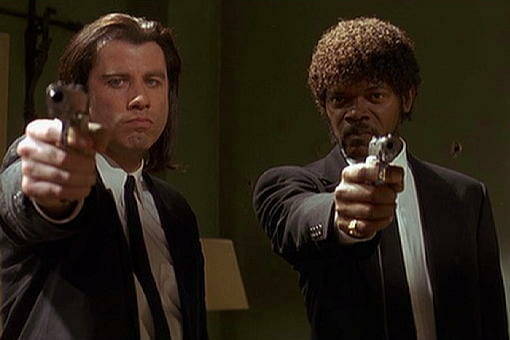
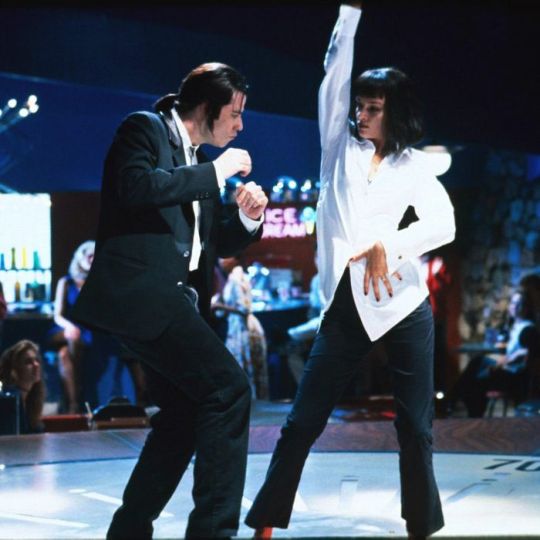
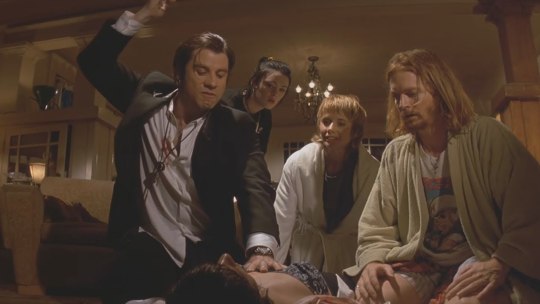
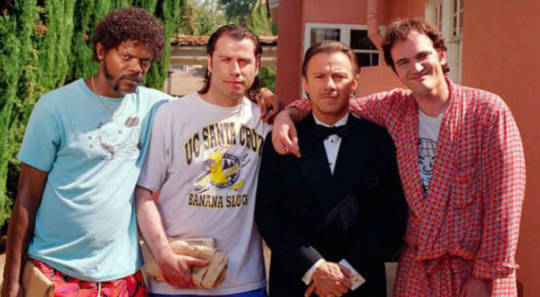
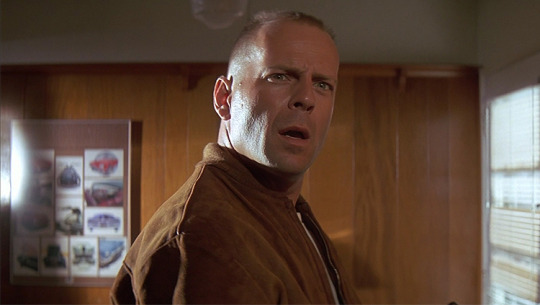
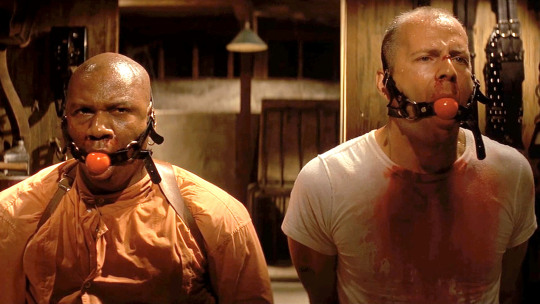
The most recent movie for review was the Quentin Tarantino crime thriller comedy (probably more things) Pulp Fiction (1994). It is a very complicated story that is told out of chronological order and focuses on scenes of meaningful character interaction. This confusion meant it lost out to movies with a more straight forward time line at the Oscars, since the move was nominated for seven awards but only took home one. The single win for best screenplay was well deserved and I still believe it is one of the most creatively written films of all time. I want to go over the plot to show what I mean, but let me do my standard due diligence:
SPOILER WARNING!!! I AM ABOUT TO GIVE THE BASIC DETAILS OF ONE OF THE MOST COMPLEX STORY LINES IN MOVIE HISTORY!!! IT WILL NOT LIKELY SPOIL MUCH OF ANYTHING, BUT I AM STICKING THIS WARNING ON JUST IN CASE SOMEBODY FINDS SOMETHING!!!
-------------------------------------------------------------------------
The film begins with what is pretty much a prologue but what turns out to be about the middle of the film chronologically. A couple is at a diner and they are talking about robbing banks. They only refer to each other as Pumpkin (Tim Roth) and Honey Bunny (Amanda Plummer). They discuss the best kind of places to rob and they decide that a diner would be a good change of pace. Impulsively, they pull out guns and hold up the diner and...title card with awesome spaghetti western music!
Two hitmen are talking about Europe as they go to do a job. Vincent Vega (Jon Travolta) talks about his adventures with Jules Winnfield (Samuel L. Jackson) as they pull up at an Los Angeles apartment complex. The two discuss their boss Marsellus Wallace and how touchy he is about his wife. The boss has apparently sent them to get something from a bunch of guys. Jules and Vincent call on an apartment with 3 college age men and intimidate them into giving over a briefcase with something glowing inside. The case is what they came for, so the hitmen take it and kill two of the men at the apartment...
Flash to a new scene in which Vincent is going to get some drugs from his dealer (Eric Stoltz). Vincent is a heroine user despite cocaine being the popular drug. It turns out Vincent was asked by his boss to take out his wife...the one he is very protective of. He just needs to hang out with her so she is not bored and not get into trouble. To accomplish this, he shoots up some heroine and goes to meet the wife named Mia Wallace (Uma Thurman). They seem to get along and he drives her to a restaurant called Jack Rabbit Slims. The place is fantastic, all the waiters are dressed up like American movie icons and the booths are repurposed cars from the 50s (if this place actually existed, you can be sure I would search it out and go there at least once). The two bond over dinner and then volunteer for a twist dance contest.
Mia and Vincent go back to her house and Vincent goes to the restroom to talk himself out of trying to score with Mia. She is pretty cool, but not worth dying for. While he is away, Mia finds some heroine in the pocket of Vincent’s jacket and thinks it is cocaine. She snorts it and immediately starts to overdose. Vincent panics and decides to drive her to the dealer’s house. The dealer has a nurse kit that comes with a giant needle full of adrenaline which Vincent stabs her with. She wakes up and Vincent takes her back home and is glad that he will live another day...
We jump to a flashback of a young boy who is has lost his father in Vietnam. An officer is visiting that has a gift. Apparently, there is a family watch that belonged to the boys great grandfather and had been passed down through the generations. His father had it when he was captured and gave it to the officer before the father died in the POW camp. The officer escaped and found the boy to give him the watch...
A boxer named Butch (Bruce Willis) wakes up from a dream. He is the boy all grown up. He is about to throw a fight for Marsellus Wallace (Ving Rhames), the same boss that everyone is afraid of. Butch does not throw the fight and accidently kills the other boxer. It turns out that he bet on himself and now he needs to get out of town before Marsellus Wallace catches him. He goes to a hotel where his rather dumb girlfriend is waiting for him. They go to bed and then are about to leave the next morning when it turns out that she forgot his watch. Butch freaks out and goes back to their old apartment to get the watch (note the very long take following Bruce Willis as he takes a back way to get to the apartment). Vincent is there waiting for him, but Vincent is in the bathroom and Butch is able to get a gun and kill Vincent as he is coming out of the bathroom. Things seem good so Butch drives off...
As Butch drives home, he sees Marsellus crossing the street in front of him so Butch hits the gas and runs down the boss but also hits an oncoming car. Both men are injured but Marsellus gains his senses and chases Butch into a shop where both are captured by a weird redneck with a shotgun. Butch and Marsellus are tied up in the basement of the shop and a man named Zed shows up. The shop owner has a gimp in a box (all leathered up and everything) and other fetish things downstairs. After a quick game to pick who goes first, they take Marcellus into another room to rape him. Butch manages to escape and is running away...but he decides can’t leave somebody to be assaulted like that. He grabs a weapon from the shop and kills the shop owner and frees Marsellus from Zed. Marsellus is not happy and says he will go “medieval” on Zed and allows Butch to leave town. Butch collects his girlfriend and leaves immediately...
Flash back in time (we know this because Vincent is alive) to right after Vincent and Jules shoot the guys with the case. Another guy in the other room jumps out and unloads six rounds at the two and misses every shot. The hitman kill that man, but Jules is shaken and decides to give up the business. They take a fourth gut with them in the car to go back to see Marsellus. On the drive over, Vincent accidently shoots the passenger while going over a pothole. The inside of the car is absolutely covered in blood and brains, so the two have to find a safe house. They go to the home of Jimmie (Quentin Tarantino) who will help them but says they have to get out in a couple of hours before his wife gets home. They call Marsellus, who sends over a cleaner named Wolf (Harvey Keitel). They are able to get everything cleaned up in time and leave with the car and the body. Jules and Vincent have to change out of their bloody clothes and decide to take a cab out to a diner for some food before seeing Wallace.
The two are at a familiar looking diner discussing whether their survival was a miracle and whether Jules should quit. Vincent goes off to the bathroom and, while he is gone, Pumpkin and Honey Bunny from the beginning declare it a robbery and it is evident that we have circled in time back around to the beginning. The couple hold up the diner, but, when they get to Jules, he takes Pumpkin hostage and devises a plan for everybody to leave. Jules allows the couple to leave alive with all the wallets, then the two hitmen follow quickly behind them before any police can show up.
---------------------------------------------------------------------------
I put a spoiler warning at the top, but there is so much to this film that there is no way you could spoil everything. I find new things to enjoy about this movie each time that I watch it and the watch count has to be at least two dozen times at this point. This film is so rich with allusion and homage to movies of the past that you might never see everything. Tarantino is truly a lover of old films and he worked every reference he could into this film. This is truly like candy for a cinephile.
I have, however, had a love hate relationship with this movie: I love this movie and I hate it when people tell me it is too violent. There was a lot of negative response to the films toxic masculinity, romancing crime culture, incredible amount of swearing, drug use, extreme gun violence, and very adult themes. There is a very famous interview between Quentin Tarantino and Jan Wahl in which she accuses him of using excessive violence and he tells her it is because it is a lot of fun to watch. His stylistically gory violence stems from exploitation films of the past and there is an established audience that enjoys it. He makes his movies for himself and this group of people.
Kind of like the comedy of Eddie Murphy, Richard Pryor, and George Carlin, you have to wade through a sea of swearing to find the comedic banter. The things that Jules and Vincent say to each other are some of the funniest stuff I have ever heard, but you really have to pay attention. Their attempts to express their feelings while maintaining their hard exterior persona is ridiculous. This is probably why many people enjoy the scenes with Vincent and Mia: there is a lot more courtesy which reduces the tirade of cursing.
The violence is very very over the top, but it is no where near the level of gore that Tarantino has become known for over the years. I must admit that he likes his torture scenes and this film is no exception. I would like to note how clever the torture scene with Butch and Marsellus is because they are both tied up and facing camera so only the audience can see the mischief that is being prepared behind them.
The soundtrack for the film is well worth mentioning as it also pays homage to 50s, 60s, and 70s exploitations films. There is a lot of silence in the film with sudden bursts of fast paced music that help with transitions. Most famous is the intro music after diner prologue, a surf rock classic by Dick Dale and The Del Tones called Misirlou. It is pure speed guitar riff along the lines of Wipeout and transitions the scene perfectly. Take a listen for yourself:
https://www.youtube.com/watch?v=ZIU0RMV_II8
Maybe the biggest thing about this film and Tarantino in general is the inspiration of the slick gangster dialogue. There had been a push for more melodramatic dialogue or the complete absence of much talking. Tarantino added in this slick, fast moving comedic dialogue that is said over extreme violence and adult situations. Marsellus Wallace talks about having some crack heads torture a man to death immediately after being raped in a basement. The hitmen talk about appropriate manners while cleaning out brains from the back of a car. Jules talks about the meaning of the bible during a robbery. Everything seems out of place in the real world but perfectly acceptable in Tarantino’s world. This is probably why I have no problem with the violence in the film.
So should this film be on the AFI top 100? Absolutely. It is an homage to film history while simultaneously introducing a sub genre that mixes current dialogue and exploitation touches to grindhouse action. It is fascinating and fun. Would I recommend this movie? If you are old enough. I can’t emphasize enough how fun I find this film, but I cannot deny that it is filled with adult situations like drug usage followed by driving, secret dungeon rape, and cold blooded murder with no consequences. If you can differentiate between Tarantino’s world and the real world, then this is great. If you can’t, then maybe try something else with slick dialogue like Butch Cassidy and the Sundance Kid.
#miserlou#pulp fiction#samuel l jackson#Quentin Tarantino#john travolta#violence#action#90s movies#academy award winner#dialogue#cinematography#introvert#introverts
20 notes
·
View notes
Text
anti LO anon opinions:
1) I pointed out the same opinion about thanatos on why he should care and a fan responded that he shouldnt have a say on hades and persephones relationship because he was making out with minthe while they were still dating...
2) I’m just so annoyed LO Persephone’s visual maturity is all in terms of hades. It’s via how he wants her to dress, how he wants her to act, via what he wants her to enjoy and do. He’s never once gone out of his comfort zone for her or branched out to see what she wants and enjoys or even really ask, meanwhile she does everything he wants at the drop of a hat. It leaves a bad taste in my mouth. This isn’t a couple of balance and compromise, its not even one of real respect, it’s just the woman making herself whatever she wants her future husband to be while he does nothing but throw money at her as “affection”. It’s essentially her having to do whatever Demeter wants, which was framed as bad, but this time it’s whatever Hades wants, so now it’s good? She still isn’t really given the choice, now is she?
3) i really have to question why LO keeps framing "dark" persephone as the queen and wife of hades because that side is framed as basically a different character who has popped out before and very purposely has said it doesnt like hades and sees him as weak and not worth their time. it also has it that persephone doesnt like or even control this side of her so its like??? is the endgame the real persephone being trapped inside herself by this evil persona and hades is married to someone who doesnt love him/outright hates him? this wouldnt be an issue if they just let Persephone be a complex character who had light and darkness in her instead of insisting at every turn she stay a “precious cinnamon roll” at all times that you need to create an out there alt-personality to explain everything away 🤔
4) LO has the regressive idea that women are all innocent victims unless stated otherwise (such as having a sex life outside Hades (Minthe, Aphrodite) or not falling at his feet (Hestia, Demeter)). The thing is, women, no matter how "precious" they are, are capable of being bad people. It'd make sense Persephone the "dread queen" would actually be cruel and not nice and even the scarier of the two of them, but the comic wont commit to it, so everyone else has to be wrong instead
5) I would be more willing to hate LO Thanatos if it weren’t for the fact Persephone is a mega rich heiress who has everyone coming to her defense for merely existing including his mega rich CEO boss meanwhile the comic seems to imply Nyx (and by extension her family like Thanatos) lost their status and power once the Big Three like Hades came to power, reducing them to subordinates and powerless to his wants and desires. It’d like an Amazon warehouse worker calling out how unfair their working conditions are only to be told “yeah well Bezos got divorced last year and he’s really sad about it, feel bad for him instead and forget your problems.” Why should I feel bad for a bunch of rich jerks who won’t face an real consequences and demean the ones who can’t stand up to them?
6) Regarding the recent LO chapter with Thanatos and Daphne talking about Persephone and Hades's relationship. I can kinda understand from both the perspectives: 1) Thanatos is a long-term employee for Hades so he has a better viewpoint of seeing the special treatment between Hades and Persephone up close. His feelings are partially influenced by his negative peers (Thetis and Minthe) who outright dislikes Persephone. But in his perspective: He is a longtime employee at a company who worked their way to a high position, and then one day your employer starts to hire someone younger and gives said younger colleague special treatment and attention (along with a big paycheck that most interns shouldn't be paid for). Part of the reason can also be that the said younger colleague is both their family background (being the child of one of the Six Traitors) and being very youthful and attractive2) Daphne only sees the relationship from an outsiders perspective and is partially defensive for her longtime friend. She is aware of Hades and Persephone's unusual relationship but also means well at knowing not to pry into others personal lives.
7) I think that in lo to protect "our precious cinammon roll" Daphne could said that maybe that is Hades fault not hers bc he give her special treatment and his bad boss. This would at least show that there is unfairness at his job, that he is rightfuly angry just maybe at wrong person. It would be at least better than "dont care about this lol"
8) Persephone in lo only work 1 actual day of work. Her first day is only a tour, on her second day she work, on third day she isnt working bc she learn how to use computer and now she sometimes try to do something with work while flirting with hades, so maybe she worked 1,5 day of work in total. It isnt surprise thst she didnt work a lot since its been 13 days in comic
24 notes
·
View notes
Text
Favorite FFIV WMG’s (from TV tropes)
Ffvi WMG
Celes and Maria are really the same person.
Celes apparently looks exactly like Maria, sounds exactly like Maria, and is able to sing opera well enough to pose as Maria. Further, the real Maria never shows up, and nobody claims to have even heard from her while Celes is with your party. Celes agrees to the impersonation plan rather quickly, after seeming to resist for all of a few seconds. Opera isn't something a beginner can just take up and instantly master. Also, it's unheard-of for one opera singer to sound exactly like another, even when they have the same range and type of voice. To be able to perform that well during the opera scene, Celes must really be a professional opera singer with years of training. Due to her genetic augmentation and magitek infusions, Celes may not have needed much combat training to perform her military duties, which may have allowed her enough free time during her off-duty hours to pursue a secondary career as an opera singer. Perhaps she has a teleport spell that lets her get to and from the opera house quickly. But she may be embarrassed about her passion for opera, fearing it may clash with the "tough chick" image she tries to project among her military comrades, so she hides this side of herself by taking on a different name and pretending to be someone else.
Out of my head, boy!
Strangely enough, she does have a secret teleport spell she doesn't tell people about: When Kefka catches up with the party under the magitek factory, she teleports away with him. Needless to say, she doesn't have this power when she's under your control, so she must be keeping it secret for some reason.
WMG
Banon and Duncan were the same person.
Think about it, we get no backstory for Banon, none at all. And he and Duncan share the same sprite, Duncan just has a different color palette. Sure, you could chalk it up to being lazy, but remember that when Edgar was using the alias Gerad, he used the same sprite as normal with a different color palette. So why not pull the same trick with Duncan and Banon, use the same sprite but different palettes to hint they're the same guy? Think about it, if they were the same person, then Duncan would easily be found by the Empire as a famous martial arts master. So he makes up an alias, and whenever the Returners refer to their leader, they use his alias "Banon" to keep his identity secret. When Vargas "killed" Duncan, he took the chance to drop out of sight and devote his full energy to the Returners - remember that the timeframe when Vargas killed Duncan more or less lines up with Locke rescuing Terra, so if we assume he sent word to Banon of this young woman who could use magic, it makes sense Duncan would use the "death" excuse to vanish and take on the Banon persona full-time. This is why Banon vanishes in Vector when the Floating Continent rises, he's going back to hide under the Duncan persona again. This is also why, despite the fact he's supposedly alive the whole time, we never see Duncan in the World of Balance - because we do see him, as Banon. This would also explain Banon's Pray/Health ability which seems to be magic, Duncan would naturally have the ability to harness the same type of energy that powers Sabin's Blitzes.
But then why doesn't Sabin say anything?
Simple - he knew, he was in on it. Being that Terra never knew who Duncan was it would make no sense to point it out to her. The people who ought to have been told Duncan was Banon knew, and the people who didn't need to know weren't told. Even Duncan's wife mentioning he's dead fits in with the idea, she either didn't know about his double life or did know and lied to people to keep up the charade.
That's actually not a bad theory. When you meet Duncan in the World of Ruin, he doesn't say a word about Vargas, even though that was a far more obvious reason for him to be dead than the End of the World as We Know It.
That also explains something that has always bugged me a bit, why Sabin was immediately accepted as part of the returners. Locke and Edgar had already been shown to be members, Terra being recruited is part of the story but Sabin just seems to be along for the ride for no real reason. If he was already secretly a member already then there would be no reason to try and recruit him.
Sabin is probably along for the ride because he's a capable fighter, and Edgar's brother.
That, or the fact that Sabin was the most distraught when his father died, poisoned by the Empire, so he'd probably be part of the Returners anyway if he knew about them. Assuming Duncan is Banon, if Sabin ever told Duncan why he ran away, then Duncan might recruit him into the Returners and make sure he knew about the Banon alias.
This theory has a tangential yet interesting implication: Was Vargas really Duncan's son? An argument against this would be that Banon betrays no hint that his son just died; shouldn't he be in grief? Yes, but neither do his parents. You can speak to both his mother throughout the game and his father later in it, and neither of them have a single word to say about the death (or even the existence) of their child. The only way I can see to explain that are that Vargus, being an uncontrollably antagonistic psychopath who kills (or claims to kill) his own father over a snub, without any display of remorse or guilt, was so awful a person that even his own parents wouldn't acknowledge him (perhaps politely expressed by his father in the form of shunning Vargas in favor of Sabin). Which *whew* would explain why Banon expresses no reaction about the death of 'Duncan's' son. Maybe he even feels relief inside. Or, 2: There's some stupidly convoluted scenario involving Duncan lying to Vargas about being his father. I prefer the first idea.
The World of Balance has continental drift margins.
At the western edge of the western-most continent, and at the eastern edge of the eastern-most continent, the shapes of the lands are such that they just about fit together, like South America with Africa.
Chalk that one up to the original War of the Magi. The world before that might well have been one prosperous continent that was subsequently split apart and reduced to a barren wasteland.
(Fridge Brilliance moment...) I hadn't actually thought of the drift being that recent, but it makes perfect sense. That opens awesome possibilities for the layout of the pre-Magi world map.
Kefka is Baram.
Kefka grew up in a crappy orphanage, where he learned to steal and fight to survive. As he grows up, he is noticed by someone in the Empire, and is taken in to become a soldier. He grows up more and becomes a general, etc etc. When the Espers were discovered, he was prepared to become the first Magitek knight. However, it seems unlikely that Cid and the Emperor Geshtal hadn't experimented at all before trying it on one of the best soldiers, so they probably tried weaker Espers on weak animals or criminals, and Kefka got to see the results, which were likely filled with Body Horror and insanity. The esper he was to be infused with was also probably out of control. It freaked him out badly and he ran away, hoping to escape the experiment. Government propaganda covered his escape as him going on a mission or something. Kefka drew upon his past experience of thieving and fighting, and became a robber with the name of Baram. He met Clyde, etc etc., until he gets injured. He begs to be killed, because he remembers what the Esper infusions did to the subjects, and wants to escape that fate. Clyde leaves him behind, and he gets brought to the Empire, where he is forced to become a Magitek knight. His anger and feelings of betrayal are amplified by the Esper's anger, causing him to snap and become permanently hate filled and angry, as well as insane. Also, both Baram and Kefka lose self-control when they see their blood: Baram breaks down when he's injured, and Kefka goes berserk when Celes stabs him. note I know this reads like bad fanfiction, and I got the idea from a Youtube comment, but I don't think this has too much fridge logic.
So Shadow tried to make amends by finishing Kefka/Baram off on the floating continent? Interesting theory.
That... is disturbingly plausible.
I have to admit, I don't favor this theory and even I have to say it's surprisingly plausible. Good job.
Madeline is the most badass character in the game
She made it through the Cave to the Sealed Gate, apparently alone and without weapons, certainly without magic, and somehow opened the gate to the Esper realm and got inside, something that on the two other occasions it is down needs the magic force of multiple Espers to be done. Even the Espers don't know how she managed to get into their realm, so clearly her ability surpasses even them. It's fortunate for the Empire Madeline isn't a playable character or she'd probably be able to take out the Guardian and storm the palace on her own.
CID : Designated Good Adopted Grandparent: Cid. After his esper infusion process turned Kefka into what he is, he tweaks the process and then runs it on the child he has been entrusted to raise, which is to say Celes. Maybe he tested it on some more folks before he did it to her, maybe he didn't, but she was certainly too young to give any kind of meaningful consent to the procedure. After that he let her be raised as a Child Soldier. But nobody ever calls him out for this particular ethical shiner.
There's also the fact that he researched the detained espers (a process that left Ifrit and Shiva near death) in the first place. The only regret he seems to feel is that his discoveries were misused; he's perfectly content with what he had to do to make them.
It might be that the only reason that he was entrusted with Celes' care was because Emperor Gestahl told him run the process on her. In that case the fact that Cid treated her as a child instead of a test subject is to his credit, not that it excuses him being involved in the research in the first place.
Nobody may call Cid out for it, but he does express regret himself, saying that there's no excuse for what he's done to the Espers, or for what he's made out of Celes's life.
Ffvi Wmgs
What if all the rentals had a cover outside of their job, and Celes is Maria
4 notes
·
View notes
Note
hii! so i was typed an infj, both by cognitive functions tests, personality tests, and the 16 personalities thingy. my enneagram is 6. so because the whole stigma around the mistypings of infj so i get really unsure of my type a lot. no other type resonates with me more but im not the calm, collected version infj’s are made out to be. as my best self i am chaotic, and excited, making no sense at all and being free. i am also not as morally righteous as infjs seem to be, however i used to be more
chaotic infj back again. i do see myself being easily manipulated by people with npd and such and can also see myself using my NiFe to manipulate others sometimes without even noticing. i also see myself adjusting to those around me to make them the most comfortable, if they need someone shy or outgoing etc. however, because of the N preference in the community i feel i might be mistyped there, when i am in fact an s. i love ideas and big abstract themes such as morality, the nova effect 2/infj
3/infj politics, mbti, etc but while still in highschool i see myself just wanting facts and facts and no abstract ideas and anytime there is not a definite answer i get anxious. this could be due to the competitive nature of my school and my perfectionism or when i get into an NiTi loop but i also wanted your opinion. i am very self aware and self reflective, hence why i can’t seem to stop doubting who i am, and i know thats a trait of infjs. i also resonate a lot with andrew garfield who is
4/infj who is an infamous infp and i know im not as idealist as i used to be with politics but i still don’t think im as free flowing as an infp because i don’t revel in being different i hate it. thanks for listening and doing what you do and if you have any thoughts i would really like to hear them
5/infj, also im sorry about using Ni and Fe and Ti and all those i forgot they were in ur faq and thats normally how i talk about mbti and i also know i used very average descriptions like morally righteous and stuff which is also in ur faq eek, im sorry i tried my best its hard to describe yourself
--------------------------------
Hi anon,
Just to get it out of the way, I don’t have a typing for this and my advice is going to be what it is for many high schoolers who have difficulty describing themselves, which is wait until you’ve developed more as a person. It’s always hard to describe yourself, but it’s much harder when many of your choices are made for you and you’re still very much in the midst of figuring out who you are.
A few things to consider when retyping yourself in the future: first, tests are garbage. They type essentially everyone who shows mild curiosity about the world as an intuitive, anyone who isn’t extremely extroverted as an introvert, and reduce the valid differences between judgers and perceivers to neat/messy. I do find they’re often kind of okay on feeling vs. thinking (in the dichotomy sense - they can’t tell apart Fi from Fe), but that’s also something that in many cases I find relatively easy to tell. Anyway, the only thing I’d consider taking away from this is that you’re probably a feeler, and the information you provided seems to back that up.
Second, I’m not sure what your sources are for INFJ behavior. The fact is because this type is so commonly over typed, you can hear arguments for basically everything since people of all types think they’re INFJs and even the same descriptions often contradict, and not in a Walt Whitman kind of way but in a “wow you did not think this through” kind of way. I mean, what kind of moral person prides themselves on the door slam, an immature and stupid thing to do*? So I would just ignore all of those and try to type yourself, as a person, based on the functions.
For manipulations; first, how many people do you know with NPD? Like, actually diagnosed? I’m not saying it’s impossible you’ve run into them but I don’t think I’ve ever run into someone personally with an actual APD or NPD diagnosis that I knew of. Second, what specifically do you mean by manipulation? I find it’s an area that gets weirdly defined on Tumblr and sometimes people use it to refer to like, normally asking people to do things for you which is just being a person. Manipulation has an implication of underhanded tactics.
For liking philosophical ideas: I find most intelligent people do. Intuition vs. Sensing isn’t a matter of liking philosophical ideas in an academic/leisure setting; it’s more specifically about how you interact with them in your actual daily life when you’re not in school or spending your free time. I’m a physicist, like, as my job, and I love physics, and I was drawn to physics by a lot of cool theoretical ideas which I still find interesting - but I have absolutely no desire to be a theoretical physicist professionally. So I have a question, and a caveat here: first, would you be happy spending your life pondering philosophical or theoretical questions as a primary thing that you do? And for the caveat: in high school I absolutely would have said yes, and as a junior in college I realized the answer was actually a strong No, which is yet another reason why I think waiting to type yourself until you’re older is often a very good idea. (Note: this is not a perfect sensing/intuition question by any means anyway - I suspect a lot of ENTJs would answer No here because of their dominant Te. But it’s a valuable question to have in mind when typing yourself.)
I think being a little older will also shed whether you want guidance because you’re a sensor or guidance because of the general nature of high school and academic pressures, and whether you want to fit in because you have Fe or because of the general nature of high school. It’s worth noting that if you’re confident in a 6 core enneagram, that might be a factor whether you use high Fe or high Fi.
I don’t place a lot of value on who you relate to; not only do I not personally know Andrew Garfield’s type I think part of the nature of celebrity (and/or fictional characters) is projecting a persona that can appeal to a lot of people, and the reasons we relate to people often are about shared experience or a shared opinion about something important to us. We can relate to people of different types quite easily - which is good - but it means it’s not really a typing tool.
And finally I guess to clarify - the reason I ask people not to use MBTI terms in asking questions isn’t because I dislike it for its own sake - it’s because it makes it pretty much impossible for me to draw my own conclusions. Typing over the internet is always a challenge because I’m relying on someone’s own unintentionally cherry-picked understanding of their personality, rather than my observation, but when they use functions to describe what they do it, I don’t even know what they’re trying to say because there’s an additional layer of uncertainty based on whether their understanding of Fe (for example) is the same as mine and so I have nothing to go on and won’t be able to answer. Believe me, if the FAQ was about things I dislike rather than things I need to type well I would just be deleting every question in which someone ended a sentence with ‘lol’.
So: no idea on type other than feeler, but I hope the above gives you an idea of what to look for in the future, with the understanding that you might not be able to type yourself accurately for a while, and that’s fine.
*as always I make an exception if you’re cutting off ties with an abuser but a lot of the door slam descriptions aren’t “I stopped talking to my abuser and didn’t tell them why because it would put me in danger,” but rather “this person BETRAYED MY CONFIDENCES and I cannot ever forgive them, they have pushed me too far this time and I have given all of myself, but I shan’t be hurt again, I cannot bear it” and it’s all extremely amateur-production-of-a-Bronte-novel and melodramatic and very silly.
#mbti#i had to look up the nova effect#and i think it's extremely nonsensical#but it is abstract i'll grant you that#Anonymous
7 notes
·
View notes
Text
Spring 2018 Anime Final Review
So, uh, this is six months late. I’ve had half of this post in my drafts forever. To make it short, as I’ve mentioned previously, mom lost her job, which has not only been a heavy hit to my sense of stability for the last six months, but also means my time to watch anime was seriously reduced and even now a slight change of plans fucks up my whole schedule and sets me back for a full week. Anyway, nobody cares about any of these shows anymore so let’s get straight to it? I’m gonna ommit the two-cours that continued into the Summer - hopefully I’ll be able to make that post soonish? idk. Worst to best, same as usual
The crappy gender politics pit of shame
Darling in the FRANXX: I think everyone has ripped this show to threads at this point and there isn’t much I could add to that. It is quite funny to me to see how many people flipped out when the show went completely bananas in its last few episodes. Feels a bit like KADO, I’ve been telling y’all this was a ton of empty crap since episode 2, it just took the writing to completely self-destruct for everyone else to notice. A part of me feels tempted to do a long post breaking down just how badly the show collapsed in its final shebang, specifically how every single twist and turn completely nulled any remote kind of message or central thesis the show may have had, but at the same time it doesn’t seem worth the time. In the end, I may have given What is Internal Consistency, The anime way too much credit. It’s not hateful antigay propaganda, it’s just dumb as shits, with a writer and creators who didn’t think for half a second of the implications of what they were doing, and who were so incompetent they couldn’t even conserve the minimal plot and character coherency within a single episode, let alone 24. In other words, Darling isn’t saying “gays shouldn’t exist” but “I have no idea of anything regarding gay people”. What makes it egregious is that the show spent so much time acting like it was “meaningful” and “important” and yet it ended saying absolutely fucking nothing. Except mayb “have babies”. Down to oblivion you go, along with the likes of KADO, to the void of shows that couldn’t even be offensively bad and no one will remember a year from now. Bonus garbage points for the half-assed “bury your gays”.

Nil of Libra Admirari or whatever this show was called: I’m not trying to diss on the show, I just genuinely never remember the title because I have the JP and EN all mixed up. Not that it matters much, as far as I could tell, the show could call Shalabalabatuna and it would have the same significance in regard to the content. But the title isn’t important. In fact, it may be a bit unfair to have this show in this section. For the most part, Main Girl is very self-determined and has an active role in the story.... but then the last two episodes heavily featured a lot of rape threats or rape themes and forced pregnancy (real and threat) and I don’t really understand why they’d go there all of a sudden. One of them was treated relatively well, even empowering the victim in the process, but when the ikemen bad guy was rambling endlessly about how he wanted to impregnate the protagonist it really turned me off :/ I’m also not a fan of “main boy was her secret fiancé all along”, but at least they also handled that somewhat decently. It’s a very disposable series, but since I watched all of Amnesia, I think I owe every otoge adaptation at least the smallest chance to clear that very low bar, and Libra of Nil does it, more competently than most other stuff in the same genre.

Hisone to Masotan: I really, really wanted to love this show. Even now, as I put it in the pit of shame category, I’m pained. There was a good show in this, and a lot of it made it to the screen: an adorable, charming little story about a woman finding her place in the world, making new friends, finding her calling and bonding with an adorable dragon. Unfortunately, it got buried down under this opressing, horrendous gender politics that tried to do something with bringing attention to sexism in the military only to cancel it out making the one dude that embodied that sexism getting rewarded with the affections of a girl he explicitly tried to crush. It also called back on the virgin or whore fallacy and even managed to shove in a “bury your gays” trope. Even though Hisone challenges the ritual bullshit, it’s too little, too late, and she does end up carrying it out anyway, so the defiance to the status quo is of little importance in terms of problematizing the ritual itself. Sorry BONES, it wasn’t meant to be this time.
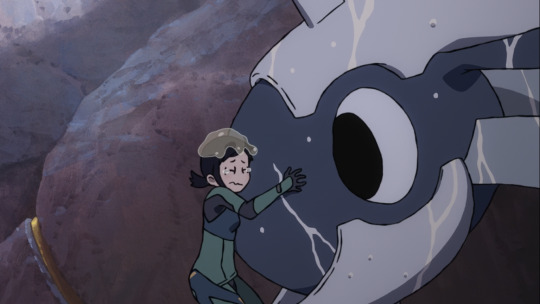
The ni fu ni fa section
Ni fu ni fa is a Mexican colloquialism for “It was okay but it didn’t change my life.”
Binan Koukou Chikyuu Boueibu HAPPY KISS: This soft reboot of the franchise had some really great episodes and did an actually good job of developping its characters. For the most part, it achieved what its predecessor did in terms of satirical comedy and I enjoyed it quite a bit. However, what bunked it down so low in the list was the final episode. At some point, the writers forgot they were doing a parody and made the show somewhat self-serious, way closer in tone to the magical girl anime it was supposed to be making fun of, rather than the satire its predecessor was. Whereas S1 ended with the whole Magical boy stuff being revealed as a crappy space reality TV show, this one ended with a real cheesy conflict about happiness and family and blablabla. Which is not bad by itself if this were a Precure show, but that kind of self-serious plot development just didn’t work for this series. I still enjoyed it, and the fanservice episode is one of the best of the whole franchise, but I’m a bit sad the finale missed the mark so badly.
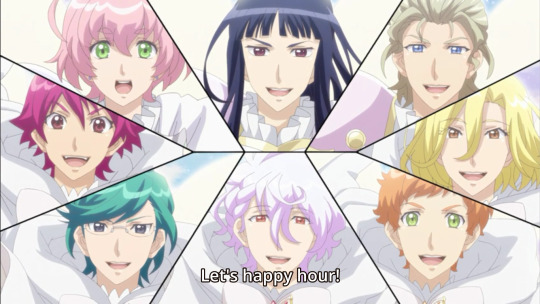
Hinamatsuri: Hinamatsuri was very hit-or-miss for me. There were some truly brilliant episodes, a lot of funny vignettes and heart-warming stories, and then there was some stuff that made me uncomfortable -like every single Hitomi story- or felt unnecessary and dry. It also threw me off that the superpower dynamic completely disappeared in the second half of the show, especially in Anzu’s part of the story. It was okay but I feel like I needed something that felt like a closing, and choosing to end it with Mao who featured very minimally in the show overall didn’t cut it. It’s a fun show, I’d reccommend people check it out, but it felt a bit too disjointed for me
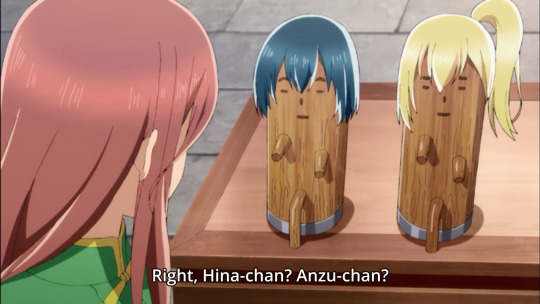
Persona 5: The Animation: This is a hard show to place because I love the looks of it and I think the concept is interesting and pretty cool, but there is something that’s keeping me from connecting emotionally to the story. The part where changing the villains’ heart makes them repent from their sins and become “good” feels very artificial and very tasteless when you’re dealing with rapists and abusers. I ended dropping it at episode 16, I just couldn’t find the motivation to catch up with the 6 episodes i’d fallen behind on because my schedule is a tragedy
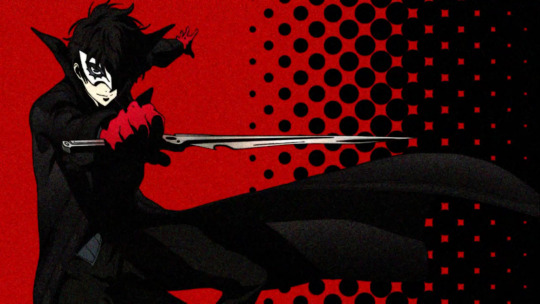
Tokyo Ghoul: Re: I guess it’s fair to say I’ve kind of outgrown Tokyo Ghoul. There’s something messy and confusing about how this season panned out, and there comes a point in which misery porn just doesn’t cut it anymore. I still watch because Ishida has a way to make every single goddamn character extremely sympathetic, which makes for an emotionally engaging viewing even when you’re not sure of what the plot is supposed to be or who you should be rooting for. I tried picking up the new season that just started airing and immediately found I had no idea of what was going on, who was on who’s side and in general, who the fuck were 90% of the characters, so I dropped it.
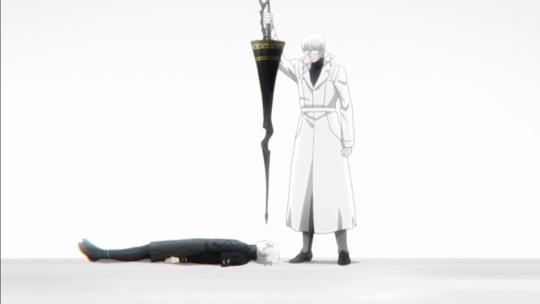
Nanatsu no Taizai: Imashime no Fukkatsu: I’ve mentioned it before, this second season had the opposite problem than the first one: the pace was too slow. It took more than half of it to get to Escanor, and then the season ends at a kind of random spot. I really thought we’d get further along on the story, since Gowther’s backstory was hinted at in the openings, but no such thing happened. They did manage to give us a variety of cool moments and fights, and I love Ban so his scenes with Zhivago and Elaine made me quite happy, though I really wish the romance between Elizabeth and Meliodas wasn’t su dubious and cringy. In light of some revelations that take place further along the manga, going out of their way to emphasize that Meliodas was a sort of mentor figure for Elizabeth when she was a toddler seems unncessary and just very squeamish. I do hope we get a third season though, and an OVA of the Vampires of whatever side story would be great too.

Rokuhoudou Yotsuiro Biyori: I was pleasantly surprised by this show, and it’s closer to being one of my top of the season than it is to “meh”. It had some weaker, cheesier segments, but it also managed great whacky moments and a genuine soothing atmosphere. What surprised me most is that the vanilla looking cast of moderately handsome dudes managed to develop into interesting, funny individuals with a dynamic that made every episode enjoyable. A solid reccommendation for anyone wanting to see delicious looking food and moderately handsome dudes being ridiculous. Also, the cat episode is the best episode of anime ever produced.
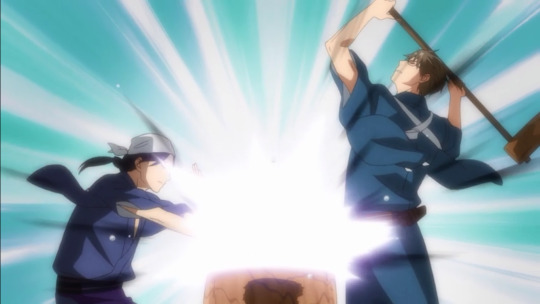
The I’m probably the only person alive who enjoys these shows
Mahou Shoujo Ore: This is a difficult show to place because it wasn’t quite as great as I wanted it to be and its parodic nature took me by surprise, but somehow I was still seriously entertained more often than not. The twists in the final quarter and the absolutely bonkers finale was a total riot, but I definitely advise caution before going in, given that some of the jokes may seem insensitive or in poor taste in regards to gender presentation, sexuality and there are even some mild harrassment jokes that certainly made me roll my eyes.
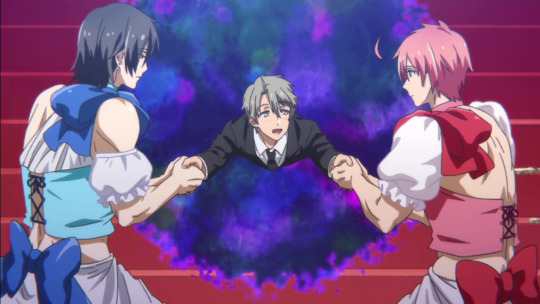
Yowamushi Pedal: Glory Line: I don’t know if anyone’s noticed, but I think through half of the show’s 25 episode run, I was convinced the title was actually Glory Road. It’s kind of anticlimactic that it’s called Glory Line if they don’t actually reach the final Goal btw. Anyway, I feel I say this a lot, but really, if you didn’t like the previous Yowapeda seasons, there’s nothing here for you, and if you did, you’re probably not gonna hop off this late in the game. This season does suffer from the same dragging than its predecessors, with the added issue of being quite pessimistic for no reason in about half the episodes, and a diminished presence for Onoda. I really wish they hadn’t dragged the Day 2 goal so long, I really hoped we’d see the end of the race, but no such luck I guess. Still love most of it and hope we get one more season or a movie to complete the story.
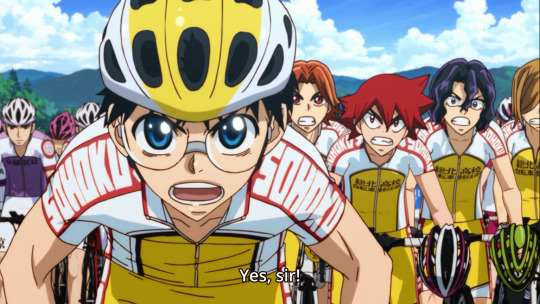
The favorites of the season
Golden Kamuy: In spite of its pacing issues, terrible animation and general clunkiness, I can’t help but love this show. When season 1 ended my feelings for it had mellowed quite a bit, but as soon as I picked up season 2 this Fall I just fell in love all over again. It’s fun, unique, over-the-top in some ways, incredibly grounded in others, and the dynamics between the characters are incredibly charming.
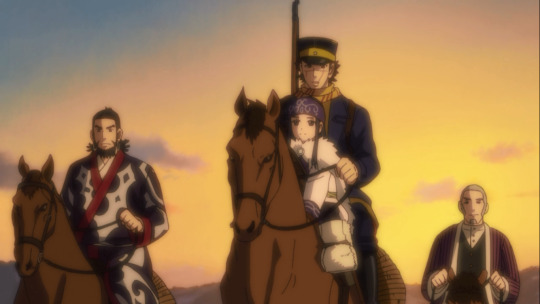
Hozuki no Reitetsu: It’s hard to talk about this one because it feels repetitive, given how tonally the show remains just the same across its three seasons. It could’ve very well been a one-season, 36 episode show, for how little it changes in spite of the time that transpired between the first season and the second. But in short, the comedy continues to be as spot on as always, the Zashikiwarashi twins are the best addition to the cast. It’s definitely a show I could watch endless episodes off, and the rare case of an episodic series with no overarching plot that I can enjoy wholeheartedly.
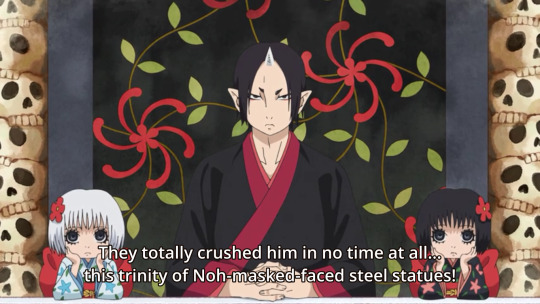
Card Captor Sakura: Clear Card arc: Over the course of the series, I’ve expressed a few concerns and misgivings about how the story of this 20th anniversary sequel was playing out. The final episode was particularly troublesome in that it left the story unfinished in spite of deviating from the manga. In spite of this, more than anything I’m very happy that this continuation still retains what made the original so special, that they captured the magic behind Sakura’s “everything will be alright” spell and gave us the chance to spend more time with these beloved characters and see their stories continue. The slow but sweet development of Sakura and Syaoran’s puppy love is a definite highlight. Needs more Touya/Yukito and Yue in general.

Piano no Mori: This show got heavily overlooked because it was kidnapped by Netflix (pls stop immediately), and then when it was finally unceremoniously dumped a month or two ago, it came under fire for the wonky CGI during the piano scenes -and it is indeed very wonky-. But beyond that, I found the story very engaging, especially because Kai is such a fascinating protagonist, his intense rivalry-friendship with Megane-kun (sorry, it’s been six months, i can’t remember names) is exactly the type I can’t help but root for. Kai’s participation in the final episode gave me goosebumps. I’m very happy we’re getting a continuation, can’t wait to see how the Chopin competition develops.
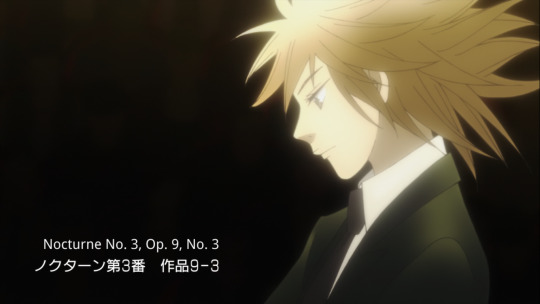
Wotaku ni Koi wa Muzukashii: Sweet, funny and absolutely delightful from start to finish, Wotakoi was easily one of the highlights of the season. Although there were some aspects about Cosplayer-senpai and Yuri Otaku-senpai’s (I’m really trying to remember the names, I’m sorry!! ;---;) that didn’t work for me -namely the izakaya segment- Narumi and Hirotaka more than made up for it with their clumsy yet adorable romance. I spent the entirety of the amusement park episode screeching. I really hope we get a continuation -and get a chance to see more of Hirotaka’s brother and his gamer friend too- and that in general we can get more anime about adult stories

Megalobox: Who would’ve thought that a show that wasn’t even in my radar before the season started would’ve end as one of my favorites, possibly of the year? Even as someone who’s only marginally acquainted with Ashita no Joe and has no interst in the sport of boxing, I was completely enthralled by the style and passion of this production. As I said a bit above, intense rivalries are very appealing to me, and the build up in the tension between Joe and Yuri was almost palpable, their mutual respect gave me chills. Definitely the surprise of the season, made even better by its optimistic happy ending to contrast with its predecessor’s tragedy. Megalobox is a unique anniversary project that is closer to an homage and it works perfectly. Definitely check it out.
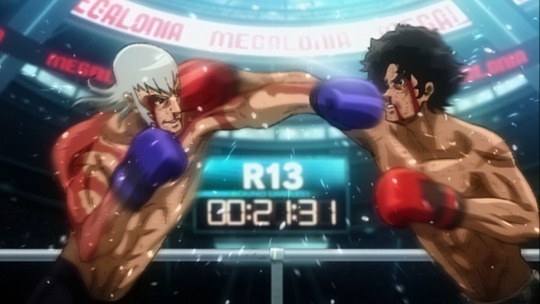
That’s it for the Spring season! I hope i can do the summer season this weekend and maaaybe even my watchlist for the Fall season. Fingers crossed i won’t get swallowed up in other stuff :’D
#anime final impressions#spring anime#god i've forgotten 95% of my tags#darling in the franxx#megalobox#wotaku ni koi wa muzukashii#piano no mori#card captor sakura clear card arc#hozuki no reitetsu#golden kamuy#yowapeda#mahou shoujo ore#rokuhoudou yotsuiro biyori#nanatsu no taizai#persona 5#tokyo ghoul: re#hinamatsuri#hisone to masotan#binan koukou chikyuu boueibu
323 notes
·
View notes
Note
I'm curious. Do you have any thoughts on Kaede and Kokichi's ingame relationship? I dunno, maybe it's an odd qurstion but... I think that maybe reading about them from the perspective of a good writer can help me write about them better. Thanks in advance!
So, first of all: sorry that it took me so long, but it’s such a complicated question that I had to take my time to think about it, talk with a friend, re-watch some fragments of the game, including their FTEs and just… think carefully about what I actually think and how to put it in a way that would actually make sense.
Okay, so the first thing that I think should be acknowledged is that both Kokichi and Kaede are very flawed characters and that they actually parallel each other in a very interesting way. And this is something that I mostly focus on in this post because I think this is the key to understanding the kind of relationship they had. Also, this post is awfully long (over 1700 words), so… Yeah, more under the cut.
The problem with Kaede is that she is very pushy. Kokichi points it out during their little Death Road of Despair experience and he’s not wrong. She likes to have things go her way and most of the time she doesn’t even realize that she’s coming off as forceful and even kind of self-rightous. A lot of her character is just a facade, just like Kokichi’s, but her is probably much less obvious than his (it also applies to Kaito and I would honestly LOVE to discuss the similarities between all three of them one day, because they are fascinating and they are the three people that have the most impact on both the final outcome of the game and our protagonist). I don’t think that Kaede is nearly as optimistic as she pretends to be. I actually believe that a lot of what we see in her audition video is visible in our in-game Kaede, just covered by her positive, always cheerful mask. But the thing is that she doesn’t truly trust in her classmates - despite the fact that she states the opposite - and that’s why she takes things into her own hands. She wants to be perceived as positive and supportive but when you look at her actions during the Death Road of Despair or at how she wants to get the mastermind on her own her true personality really shines through this mask she made. And I think that Kokichi is aware of it, he’s not fooled by her cheerful persona the same way that others are. He’s immune to her motivational speeches (and Kaito’s, but it comes later), but at this point in the story he also seems to recognize that something good can come out of them? And it’s not something that he could do himself so he lets Kaede become their self-proclaimed leader as long as it motivates others to keep fighting. He’s a person who values life above anything else and I think that this is something that you need to keep in mind when analyzing his character because it’s such an important element of his character.
In general, it’s kind of hard to predict what would have happened, because Kaede never got to overcome her flaws and grow as a person, we never see her actually develop. Very early in the game one of her biggest flaws is introduced - and this flaw leads to her doom. I assume that if she lived longer she would get at least a chance to change, to overcome it, but it’s just me guessing and hoping and assuming. And even if she got a chance the develop it still doesn’t mean that she actually would develop, at least in a positive sense of this word. And the worst thing about the game is that she ends up being treated like a perfect waifu, like she was a victim of this situation, so I’m not sure if they would actually go this way. I’m kind of worried that she would be just Maki 2.0? Because Maki’s flaws are also never fully acknowledged, which is honestly a shame because it would be a chance for her to and also make the game much more self-aware.
Because yeah, in Maki’s case the way she is treated has at least something to do with just catering to the audience, especially the male audience, and in her position as the game’s waifu. But when you think about it - her admitting that what she did was wrong, admitting that she went against her own promise to herself and against what Kaito tried to teach her… wouldn’t strip her of her waifu status, wouldn’t impact players’ perception of her negatively. If anything, it would only serve to make her more relatable. And something similar happens with Kaede, the game kind of admits that what she did was wrong and she actually gets punished for it. But the game also immediately after her death changes its narrative and turns her into this perfect martyr who did nothing wrong, which is just… so painfully contradictory. Looking at it that way I think that both Kaede and Maki got the short end of the stick. Sure, they are both popular and generally loved by the fandom characters, but the game had a chance to go deeper with them and explore them better, but never did, instead simply skimming over the surface. As much as I hate the argument that they both are kind of reduced to being love interests… well, let’s just say that I don’t agree with it 100% but I also see where people who say that are coming from.
The most interesting thing about Kokichi and Kaede is probably how different their brands of leadership are. As I mentioned earlier, Kokichi pretty much lets Kaede do her thing, simply observing what is going to happen. but the moment he notices that her own blind ambition is getting in the way of her good intentions - he calls her out on her bullshit. The main difference between them is that Kaede immediately made her leader status known, whereas Kokichi always works from the shadows, collecting evidence on his own, trying to find out who the mastermind is.
Honestly, the most interesting thing that would come out of Kaede living longer in relation to her relationship with Kokichi is probably the way they would challenge each other, the same way we see it happen at the beginning with the Death Road of Despair thing. Shuichi can be seen as very passive compared to her and it’s honestly both a good and a bad thing, depending how you look at it or who you ask. It’s good, because it lets the player just observe things, observe how those characters react and behave on their own, without your protagonist’s interruption. But at the same time you as a player end up being an observer rather than someone who has actual impact on the story, unless maybe during the trials when it’s your job to solve the case. On the other hand, while Shuichi is rather passive, Kaede is his total opposite. She lacks his patience and she can be actually very… um, unpleasant? Just look at her FTEs with some of the others or her first interaction with Tsumugi (well, to be fair, Tsumugi was kind of rude herself, but still). She quickly gets physical with others and not necessarily in a good way. As much as I would like to believe that she would be more willing to understand Kokichi, I also think that she might be too pushy to actually get to him? Kaede forces her way through things, while Kokichi surrounds himself with lies and hints, I’m not sure if Kaede actually has the patience to deal with this kind of thing, she is very clearly tired of his antics during their FTEs. I like to think that she wouldn’t be as antagonistic towards him as others are and that she would defend him when Maki abuses him, but considering how narrative is very clearly against Kokichi, to the point that at times many characters come off as out of character… I’m honestly not so sure if that would be the case? But then again, she’s much more firm with him than any other character and it’s something that should be acknowledged. Kirumi is kiiiind of similar? But because of her devotion to her talent Kirumi also lacks Kaede’s individuality and doesn’t stand her ground the same way Kaede does.
Another thing that I would like to point out is that Kokichi changes a lot later in the game. He gets much more serious and more desperate as more people die. In Kaede’s first FTEs with him Kaede thinks that he acts like a kid who wants attention and… she’s not wrong? He really does act that way, especially at the beginning. He’s testing her limits, messing around and in general acting like a brat. Buuuut at the same time during their second FTE he warns her about what might happen if she continues to act the way she does and it’s actually very insightful? And, well, turns out to be true. It’s also kind of ironic considering that ultimately he also couldn’t catch the mastermind and had to sacrifice his own values in the process.
I think that Kokichi also has a lot of respect towards Kaede, which is seen in how he says goodbye to her and states that she wasn’t boring. I think a lot of this respect comes from the fact that in contrast to other students she actually tried to do something to stop the killing game. She went about it the wrong way but considering how extreme the situation they were in was… it makes a lot of sense and I think Kokichi understands that. He’s later shown to be very frustrated with the passiveness of others and how they kind of just accept the situation and hope that the power of friendship will solve everything. Both he and Kaede refuse to just stand and watch as people die and even though they both ultimately fail, they are also the ones who actually do something and pay the highest price for it. Same can be said about Amami, which is why chapter one is so tragic.
Anyways, that’s just my own personal interpretation, you don’t have to agree with it! Also, I hope that this word vomit makes sense, I tend to jump from one topic to another.
In conclusion, I think their in-game relationship is super interesting and I would honestly love to see more of it. And it gets even better if you add Kaito to the mix because all three of them are one of the most important characters in the entire game and the impact they all had on the story is very interesting. Not to mention that they shape Shuichi into the person he is at the end of the game and it’s fascinating to watch as he evolves throughout the game.
#ndrv3#kaede akamatsu#ouma kokichi#ndrv3 killing harmony#ndrv3 spoilers#analysis#does it count as meta?#I have no idea#it took ages to write#and I probably have much more to say about the topic but#it's insanely long anyway
97 notes
·
View notes
Text
anyway i promised i’d talk about my reaction to cog and like, idk who cares, but i’m here on my soapbox anyway
obviously don’t fuckin read any farther if u haven’t seen it, i’m going in hard with the spoilers
i’ve talked about the mcg cameo and we’re ignoring that
they did dumbledore so fuckin dirty
they did queenie so fuckin dirty
the whole plot was a confusing and kind of pointless-in-and-of-itself setup for the next three movies, which i understand is necessary in some sense for a very long story like this, but if you can’t make a movie’s plot enjoyable and understandable as its own being, then you haven’t done a good job. cog’s primary function cannot be to lay the groundwork for movies that haven’t come out yet; it has to stand on its own, and i’m not sure it does
grindelwald’s kind of a joke
if you’re going to make nagini a character (and we all know the issues with that in the first place), you could at least bother to give her a personality
they did leta dirty too, she deserved more than a one-movie character arc
i don’t think tina’s characterization was badly done, but i do think she deserved more time, and they did a really bad job of showing the status of tina and newt’s relationship in the intervening nine months imo
i don’t think credence joining grindelwald is a bad story choice, but i do think it was handled incorrectly. they should have played into the “i’m being persecuted and i feel alone and scared and he may have used me but so has everyone else in my life and he seems to care about me so i’m going to go with him because i think he can keep me safe” aspect instead of reducing it to “he can tell me my real name”
on the bright side i continue to adore newt and his creatures, and i think eddie redmayne’s acting is fucking fantastic
credence being dumbledore’s secret long-lost much-younger brother is about as farcical as voldemort having a secret daughter with bellatrix lestrange
more under the cut. i’m about to go into highkey analysis mode.
queenie
yeah i’m fucking mad about this. the closest i came to crying in the entire movie was because i was so upset about what they did to her character. not bc it moved me but bc it pissed me off. queenie goldstein is smart, capable, and empathetic. i was so happy to see her again -- for about five seconds, until we found out she’s enchanted jacob so she can marry him without his consent? what the fuck? and then she spends the rest of the movie with no other motivation than to be with a man? she’s apparently so stupid and blind that she would join grindelwald, genuinely thinking grindelwald’s going to create a world where muggles are allowed to marry witches no problem? grindelwald’s manipulative tactics are blindingly obvious, and yet the woman who has spent her life learning how to read people and manipulate them in turn for her own protection can’t see that she’s being played?
fuck that. that’s not the queenie goldstein i know. and i’m not cool with her being turned into the “woman who makes bad, stupid, blind choices out of her desire to be with a man, because that’s all women really want, i guess” trope.
the only way i can see her joining grindelwald is if she followed credence, to protect him, and was a double agent from the start.
grindelwald
not even getting into johnny depp as a person, he’s clearly the wrong person for this part. it would’ve been better to keep the percival graves persona going than to turn grindelwald into a bleached rat who has apparently never seen the light of day. colin farrell was the perfect example of a seductive villain. grindelwald as graves was confident, persuasive, compelling even after you realized he was the bad guy.
grindelwald should have stayed that way even after he showed his true self or whatever. they kept telling us that he was seductive, that he couldn’t even be trusted with a tongue or he’d turn every guard to his side, and yet? i saw nothing of the sort? johnny depp’s grindelwald, both his acting and the character design, screams “i’m the big villain and you should hate me because i’m sleazy and creepy.” but that’s not how you gain followers. tom riddle was charming and handsome and persuasive; it was only after he gained power that he slowly became the inhuman creature we think of as voldemort, and that was after everyone was too scared of him to defect. grindelwald should have been smooth, should have been charming, should have showed a real ability to connect with the people he wanted to convert. and, you know what? he should have been handsome. he should have stayed jamie campbell bower tbfh. people follow a pretty face.
the point is he seemed like a caricature, an obvious villain. not somebody i can believe could genuinely win so many people over to his cause. you can’t just tell me he’s seductive and then make me watch pasty johnny depp make vague, empty speeches the whole time. not good enough.
dumbledore
i mean, i don’t have a problem with jude law. i think he did a pretty good job. so there’s that going for him.
too bad they were off with.....pretty much everything else.
i’ll stick with my two biggest complaints, i guess. the first is that it makes no sense for dumbledore to be out here talking to anyone who asks about his sister and his relationship with grindelwald. the whole thing in dh was that nobody knew he’d ever been affiliated with grindelwald -- his oldest friends refused to believe it. it happened over the course of one summer, they kept their plans secret, and it ended in disaster. and we know dumbledore never talked about that shit, not till he fuckin died. so why would some ministry dude be able to waltz in and say, yeah, we know u and grindelwald were close as brothers, and why would dumbledore respond that they were closer?? why would he ever disclose that??? that was secret fuckin information my dudes
same with ariana. i get the spin on empathy, but i don’t see him just casually bringing up his sister to leta. maybe i’m wrong on this one, idfk, maybe he would use ariana as an example to relate to a hurting student -- but i have a hard time imagining him bringing it up like that. it’s his shame. seems to me like another one of those things he’d avoid mentioning unless he absolutely had to.
and then. then there’s the whole fuckin grindelwald relationship thing in the first place.
i get that they’re trying to correct themselves. “you calling dumbledore gay without making any real references to it in canon does not count as representation,” we said, so now they’re making it real clear. but, really? really? you think dumbledore would look into the mirror of erised and see the current grindelwald? you think grindelwald is the deepest and greatest desire of his heart, and not, idk, his family, whole and unharmed? you think his love for grindelwald defines him more than any of his other motivations? no. bullshit.
as far as i can tell, they made dumbledore’s gayness central to his character in this story -- which is just as bad as not acknowledging it at all. because his relationship with grindelwald doesn’t define him, it certainly isn’t more important to him than his grief for his family, and he has plenty of motivation and character that doesn’t stem directly from his encounter with grindelwald, so (as tempting as it might be for mediocre storytellers) to spin his entire characterization in the fantastic beasts arc around the fact that he was gay for grindelwald when he was 17 is not only a disservice to his character, it’s also just shallow writing.
#cog spoilers //#there's more i could say but i mainly wanted to talk about queenie / grindelwald / dumbledore#so there we go#that's my piece#i'm gonna stop myself from rambling more in the tags#also most of this is negative but let me say that there /were/ things i enjoyed about the movie#there totally were#but it's more fun to analyze where i think they went wrong#and hoo boy were there plenty of places they went wrong#; wandless ( ooc. )
14 notes
·
View notes
Text
Time Heist - Doctor Who blog
(SPOILER WARNING: The following is an in-depth critical analysis. If you haven’t seen this episode yet, you may want to before reading this review)
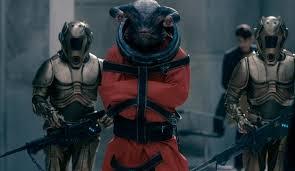
Oh God, Stephen Thompson is writing this. No. Worse. Stephen Thompson and Steven Moffat are writing this! Heaven preserve us!
Well everyone can relax. Time Heist isn’t as bad as The Curse Of The Black Spot or Journey To The Centre Of The TARDIS. In fact Time Heist is actually surprisingly good. Well... it’s good up to a point, but we’ll come to that.
It’s a great premise. The Doctor and Clara are joined by augmented human Psi and shapeshifter Saibra to rob the bank of Karabraxos. The most secure bank in the galaxy. It’s a brilliant opening with some proper sci-fi in it. (I particularly like the little detail of using your breath to open code locked doors). And then there’s of course the Teller. LOVE it! It’s a great design for one thing and its powers are incredibly scary. It can sense your guilt and turn your brain into soup. Very creepy, although sadly undermined by the image of those people with their heads flattened. Ms Delphox puts them on display as a warning, but all it did was just make me snigger. Come on, you have to admit they do look just a little bit silly.
I also really like Ms Delphox, played by Keeley Hawes. While she does unfortunately get saddled with Moffat’s dominatrix dialogue and persona just like all of Moffat’s other female characters do, Hawes does such a good job in the role and really makes the part her own. She has such an authoritative presence on screen and is clearly having a lot of fun in the role. I particularly like how Delphox isn’t just evil for the sake of being evil. Due to the bank’s ultra strict security system and protocols, if Delphox fails to catch the robbers, she will be incinerated by her boss. It’s something different, which is nice.
Time Heist has a really good pace, Everything zips along very nicely and I was glued to the screen for the most part. I also really liked the characterisation. Top of the class is of course Peter Capaldi. He’s absolutely brilliant in this episode, capturing the Doctor at his very essence. Despite the fact Psi and Saibra know absolutely nothing about him and have no reason to trust him or take orders from him, the Doctor is able to take charge using the sheer force of his intellect and personality. Peter Capaldi is the Doctor. I also loved the scene where he rebukes Psi for accusing him of being cold and emotionless about Saibra’s ‘death.’ The Doctor has always been one to prioritise the job at hand over mourning the loss of someone, but this Doctor really doesn’t wish to be bogged down in sentimentality. Nine and Ten often express their grief with a brief sorry before moving on, whereas Twelve seems to prefer to keep it all to himself and just get on with things. He may seem uncaring, but his face when he’s walking away from Psi speaks volumes. He does care very deeply. He just doesn’t want to express it. The other characters are good as well. Out of the two I think I like Psi more. Johnathan Bailey does a really good job in the role and I like his motive for breaking into the bank. Wanting to reclaim the lost memories of his friends and family. And the scene where he sacrifices himself to save Clara was very effective. Saibra was good too and Pippa Bennett-Warner gives a good performance, but her motivation is a bit weak. Okay, I get the whole thing about shapeshifting every time she touches someone, but what’s the deal with this line:
“How could you trust someone who looked back at you out of your own eyes?”
Wha... What does that mean exactly? It sounds like typical pretentious Moffat bullshit to me.
Also Clara is pointless. Seriously, why is she even here? What role does she play? The Doctor is clearly the leader (and secretly the Architect). Psi is the hacker. Saibra is the shapeshifter. What’s Clara’s role? She’s not even the Doctor’s moral compass like in Into The Dalek. She’s basically just tagging along for the ride. If there was ever an episode that perfectly demonstrated how utterly useless and one dimensional Clara really is, it’s this one.
Yeah, I suppose I can’t put this off any longer. While there are large portions of Time Heist I did enjoy, a lot of the episode is sadly hampered by Moffat and Thompson’s usual sloppiness. Since we’ve just been talking about the characters, let’s talk about the ‘exit strategy.’ Presumably a way for the characters to painlessly kill themselves should the Teller discover them. A very dark idea, but also a completely ineffectual one thanks to its execution. If you’ve seen any sci-fi ever, you’ll know what a teleport looks like, and the fact that the effect we see when Saibra and Psi use the shredders look suspiciously like teleports does negatively impact the tragedy of their ‘death’ scenes because, in the back of your head, you’re wondering where they’ve gone off too and when they’ll be coming back. But even if you didn’t pick up on that, it still doesn’t work because their surprise return effectively undermines their sad and touching deaths in order for Moffat to pull a ‘gotcha’ moment.
Then there’s the Architect. Who here honestly thought he wasn’t the Doctor? It’s such a painfully obvious twist. He’s a time traveller, like the Doctor. He has access to memory worms, like the Doctor. They even chuck in a massive clunker of a clue by having the Doctor outright state he hates the Architect. Since when has the Doctor ever said that about anyone? He can’t even admit he hates the Daleks for fuck sake. The only possible person he could be referring to is himself, at which point you soon realise that this episode isn’t about a bank heist at all. It’s yet another episode that’s all about the Doctor, this time about his self loathing and manipulative tendencies. And it actually reduces the stories of Psi, Saibra and the Teller because you realise that the only purpose they serve is to shine a light on the Doctor. Loneliness bad, companionship good. This is the fifth story in a row that has focused exclusively on the Doctor. Anymore and the show is seriously at risk of disappearing up its own vortex. Why can’t the episode have just been about the Doctor breaking into a bank and saving Mr and Mrs Teller? I like that idea. It’s something different and it’s a very Doctorly motivation for breaking into a bank. Why does everything have to be so inwardly focused nowadays? I don’t mind the odd episode that explores the Doctor’s character (provided it’s done well), but this is taking the piss.
And then there’s all the plot contrivances. For the most secure bank in the galaxy, its security is unbelievably shit. Putting aside the almost comically oversized vents that anyone can comfortably crawl through, how come the guards seem to be searching for the intruders everywhere but near the fucking Vault where the valuables are kept? You’d think Delphox would post a couple at the door or something just in case. And what about the scene where the Doctor and Clara are captured? Before Delphox set the Teller on a random person that was just guilty for a crime he was about to commit. But with the Doctor and Clara, Delphox decides to take the Teller away for a little nap and let the guards deal with them instead. Why? But what really spoils Time Heist completely are the two gaping plot holes at the centre of the narrative.
The first is the solar storm. This is the only time the bank is vulnerable, but it’s also the only time the TARDIS can’t land. Well... why don’t you just land the TARDIS at a time when there isn’t a solar storm? The Doctor said it himself at the beginning. Robbing a bank is easy if you’ve got a TARDIS. In fact I’m assuming that was how he planted all the briefcases. If he could do that, why not just materialise the TARDIS right inside the Private Vault, grab Mr and Mrs Teller and go? You wouldn’t even need to bother with the memory worms. The second plot hole is Madame Karabraxos (also played by Keeley Hawes). So what sets all of this in motion is a dying Karabraxos from the future phoning the Doctor and begging him to save the Tellers. The entire plot hinges on the Doctor giving her his phone number and then just hoping she’ll miraculously grow a conscience and realise what a horrible, selfish bitch she was when she has no reason to. (yes i know there’s the whole self loathing thing with the clones, but that’s really not good enough. It also doesn’t make any sense. if you hate yourself so much, why would you create clones of yourself in the first place?) It’s also completely reliant on Karabraxos not losing the phone number, except why in God’s name would she keep it? At this moment in time, she has no reason to take the Doctor seriously yet and clearly has no interest in redemption just yet, so why hang on to the phone number? It’s absolute nonsense.
Like I said, there are a few things about Time Heist I liked and I did enjoy it to a point, but what ultimately holds it back from greatness is Thompson’s usual ineptness when it comes to basic storytelling as well as Moffat once again putting more effort into trying to outsmart the audience and prove how clever he is rather than writing something that’s actually satisfying and worthwhile. Overall, good idea, but sloppy execution.
#time heist#stephen thompson#steven moffat#doctor who#twelfth doctor#peter capaldi#clara oswald#jenna coleman#bbc#review#spoilers
6 notes
·
View notes
Text
Slightly More Detailed Character Nonsense for Baron Skeleton
It is weird how I’ve made more progress on this story concept in the last couple of days than I have in rest of the couple of years since I came up with it.
This builds off of/refines the rambling brainstorm stuff I did in this post, just in case you missed it.
Baron Skeleton Character List
Size Classes from Smallest to Largest: Scout, Basic, Deluxe, Mega
Villain Team
Baron Skeleton
Character Role: Big Bad
Motifs: Skeleton, Cobra Commander, Skeletor
Size Class: Basic
Toy Gimmicks: Snap on Chest Armor
Personality: Manic and almost perpetually annoyed, Baron Skeleton is prone to spiteful rants and loud tantrums. While anger and frustration are basically his default emotions, he rarely directs these feelings at the people around him, being more likely to rant about bad luck or society being rigged instead. Despite his volatile temper, he’s actually far more patient with his henchmen’s quirks that you’d expect, and genuinely likes the people he works with. Unlike the villains he’s based off of, Baron Skeleton is never abusive to his underlings and generally tries his best to accommodate their needs and desires in his schemes, even if doing so often results in failure. Though he talks as though his worlview is bleak and cynical, Baron Skeleton notably refuses to ever give up the fight – he always has another scheme for victory after each defeat, and rarely dwells on his failures for long before moving on to the next plan.
Meta Stuff: As the show’s protagonist, he’d get a lot of toy variants with different gimmicks, like “dragon blast armor” and the like. The show would work these in as clumsily as possible.
Snakeman
Character Role: Big Bad’s Wacky Sidekick
Motifs: Snake, Barbarian
Size Class: Deluxe
Toy Gimmicks: N/A
Personality: Though technically Baron Skeleton’s number two, Snakeman’s real function is as Baron Skeleton’s best friend. As the second in command, Snakeman is terrible – he can never keep Baron Skeleton’s plans straight even on the rare occasions where he actually listens to them, and always ends up derailing things by “winging it.” As a best friend, though, he’s marvelous – he’s always there to listen to Baron Skeleton’s problems, and he’s always doing his best to cheer Baron Skeleton up. One could say that Snakeman gives Baron Skeleton what he needs instead of what he wants. Snakeman is also a very chill boss to the other underlings, rarely dolling out punishments and always willing to hear them out. Like most of the bad guys, he can actually be a competent fighter when he applies himself – he just rarely ever does so.
Meta Stuff: Snakeman’s design should be as He-Man-y as we dare to get.
Newbie/Edgelord
Character Role: Fish Out of Water, Eviler Than Thou
Motifs: Grimdark villain
Size Class: Scout as Newbie, Deluxe as Edgelord
Toy Gimmicks: Clip On Spike Armor (Edgelord only)
Personality: Newbie’s role in the first season is to be the fish out of water character who triggers exposition from the pre-established characters, but overall his real purpose is to contrast the bad guy’s outdated style of supervillainy with a more modern Grim & Gritty take. Newbie is the only bad guy who is legitimately evil rather than just weird and antisocial. He views murder as the best solution, and all of his suggestions for plans essentially boil down to “kill as many people as possible.” He’s sadistic and cruel, and the other bad guys are ultimately unsettled by him (though many, Baron Skeleton included, still try to turn him around to their way of thinking). Once he becomes Edgelord, he dives straight into the most Grimdark of villainy, doing his best to put every face-removing Joker to shame. Edgelord is the one character on the show that the audience is invited to hate without any regret.
Meta Stuff: While Newbie’s action figure should just be a variant of the Henchskull figure (with a different head and color scheme), Edgelord’s should be a 100% new mold to better make him stand out as a character from a very different take on the superhero genre.
Gargruel
Character Role: Starscream
Motifs: Demon/Gargoyle, Gaudiness
Size Class: Basic
Toy Gimmicks: Clip On Armor (more elaborate than Baron Skeleton’s)
Personality: Gargruel is a perpetual traitor, trying to usurp Baron Skeleton’s leadership at every opportunity. It is literally a pathological tendency of his, and one of the rest of the bad guys have just learned to deal with. Perhaps the hammiest of the villains, almost every word out of his mouth is a loud, theatrical declaration of his superior mind and strength. Of course, Gargruel is nowhere near as clever or strong as he thinks he is, and always ends up overreaching. Despite his superiority complex, the others consider him a friend, and he is always quickly forgiven for his repeated betrayals (especially since they tend to implode on him almost immediately). It helps that he can actually be a pretty nice guy on the rare occasions where he isn’t talking himself up.
Meta Stuff: Gargruel’s outfit should look like a much flashier/gaudier take on Baron Skeleton’s. His toy would probably even be a retool of Baron Skeleton’s toy, with different gloves, boots, and clip on armor as well as a new head.
Galvanstein
Character Role: Fanatical Loyalist
Motifs: Frankenstien, Executioner
Size Class: Deluxe
Toy Gimmicks: Spring-loaded Extendo-Fists
Personality: An utter sycophant, Galvanstein is a yes man and Baron Skeleton’s greatest enabler. Galvanstein is utterly devoted to his boss and believes every idea Baron Skeleton has ever had is absolute genius. The only reason they fail, he reasons, is that the other henchmen aren’t pulling their weight, which is why Galvanstein is overly critical of his peers. He’s not a complete dick to them though – after all, Baron Skeleton clearly saw potential in them, so they must have some good sides. Galvanstein’s loyalty is his greatest weakness, as he can never bring himself to admit that his boss is flawed. Likewise, he has no improvisational skills – while he will gleefully carry out Baron Skeleton’s orders to the letter, he is at an absolute loss whenever a plan gets derailed and forces him to think for himself.
Meta Stuff:
Nosferoi
Character Role: TFP Soundwave
Motifs: Vampire, Boba Fett/Samus/Cool Helmeted Space Warrior
Size Class: Basic
Toy Gimmicks: Grappling Hook Claw, Removable helmet
Personality: Quiet and thoughtful, Nosferoi is the most competent villain in Baron Skeleton’s organization by a long shot. She has the highest success rate of any henchmen, pulling off her tasks efficiently and with a great deal of style. When she contributes to a plot, her suggestions are always cunning and well-reasoned. If she was the gang’s leader, they would have won ages ago – but she doesn’t want to be a leader. In fact, Nosferoi is much happier as a henchman. She likes following orders more than giving them, and thinks Baron Skeleton’s schemes are far more fun to carry out than anything she could come up with, even if they’re doomed to fail. Unlike most of the other villains, she doesn’t really want to win so much as she just wants to hang out with her friends, and is content to just do her part of the job well instead of trying to fix their operation.
Meta Stuff: Nosferoi should look rad as hell.
Spinestra
Character Role: PG Seductress
Motifs: Spider, PG Rated Dominatrix
Size Class: Basic
Toy Gimmicks: N/A
Personality: Supposedly a master manipulator, Spinestra’s role tends to focus on finding ways to play mind games with the heroes that Baron Skeleton’s forces oppose. She’s not quite as good at this as the others think she is, but she does her best to come up with dastardly schemes to set the heroes against each other. Her real skill lies in trap making, and many of the defense systems in the villain team’s fortress are of her design. Spinestra also often helps with the team’s plans, though she’s sort of a double edged sword – her contributions are so complex that the heroes can’t follow them, but, sadly, also end up confusing the other henchmen more often than not, resulting in a bungled operation. While she tries to act cold and aloof like Nosferoi, she has a ferocious temper and cannot take criticism well.
Meta Stuff: in the vein of villains like Evil-Lyn and Baroness, Spinestra has a vague dominatrix vibe that’s intensely watered down so as not to anger parents (ignoring the fact that they could have just not made her look like a dominatrix in the first place).
Swampstomp
Character Role: Bumbling Brute
Motifs: Swamp Monster, Gill Man
Size Class: Mega
Toy Gimmicks: Tummy Prison
Personality: The muscle of the villain team, Swampstomp knows she’s valued for her brawn and not her brains, and is totally fine with that. She’s the largest of the core henchmen and hits the hardest by far. Swampstomp revels in her role as a dumb brute, cheerfully taking orders from anyone who acts even the slightest bit authoritative. When Gangruel initiates a coup, Swampstomp is generally the first to fall in line, and likewise she’s one of the first to switch back to Baron Skeleton when the old boss reasserts himself. While Swampstomp gleefully embraces her dumb muscle persona, she’s actually more perceptive and intelligent than anyone gives her credit for, herself included. Likewise, while she generally plays up her love of beating people up, she really isn’t the sadist she thinks she is, and is utterly revolted at people who are genuinely vicious.
Meta Stuff: Swampstomp’s gimmick is that she can swallow smaller figures and store them in her tummy. Because this is a pretty intricate gimmick, Swampstomp’s mold would be entirely unique, so her design has more leeway to be strange than most of the others.
Dr. Strategerm
Character Role: Straw Vulcan
Motifs: Mad Scientist, Chess, Mathletes
Size Class: Basic
Toy Gimmicks: Swappable hands
Personality: Dr. Strategerm claims to value logic and rationality, and tries to reduce all problems to mathematic equations that come to one objective solution. Ironically, he is utterly irrational in his devotion to this philosophy, and will passionately argue about how emotions are distractions that keep people from being run by pure, perfected logic. Strategerm creates all the high tech weaponry and gadgets that the group uses and is prone to sesquipedalian loquaciousness. He has a notable rivalry with Hexadeth, being her foil.
Meta Stuff: Dr. Strategerm’s hands can be switched out with multiple different tools, like a claw, a hammer, a drill, etc. His toy would use Baron Skeleton’s body mold, but with a cloth labcoat draped over its torso and legs to disguise the mold reuse. His arms and head would be entirely new pieces.
Hexadeth
Character Role: Sorceress
Motifs: D&D, mummy
Size Class: Basic
Toy Gimmicks: Dice of Doom Accessory
Personality: Superstitious and traditional, Hexadeth is a master of magic who insists on doing things the “old way” and hates technology. Though her magic is extremely powerful, her resistance to catch up with the times often bites her in the butt, as her enemies often use technology that she is not prepared to deal with. She has great skill in dealing with emotional and spiritual matters, but has nothing but disdain for logic and science. She often butts heads with Dr. Strategerm despite the fact that she essentially does the same thing as him – i.e. create new weapons and equipment for the others. Her dialogue is also similarly hard to parse, as she loves purple prose and antiquated linguistics.
Meta Stuff: Hexadeth’s toy uses the same body tooling as Spinestra, though it is disgused by her cloth robe and cowl. Her head, hands, feet, and shins all uses new pieces that are sculpted to look like they’re covered in bandages. Her gimmick/accessory is a set of dice – 1d20, 1d10, 1d6, and 1d4 – with different magic symbols on them, which in the show she uses to cast her magic spells. She might also come with a cup that automatically rolls them or something – we can have fun with it.
Oddserver
Character Role: Wild Card
Motifs: Eyeball, strangeness
Size Class: Mega
Toy Gimmicks: Removable Parasites
Personality: Considered weird by the other villains, which says something considering their own quirks, Oddserver is an alien juggernaut that marches to the beat of its own drummer. The enigmatic monster is unpredictable – sometimes it will follow the team’s plot to the letter, and other times it will break off and do its own thing. Oddserver’s actions always serve a purpose, one that always benefits Oddserver even if it does little if anything to help the others. While Oddserver’s nature and motives are mysterious, there are some moments where it shows clear affection for the other villains, and they consider it to be part of the team all the same.
Meta Stuff: Like Swampstomp, Oddserver’s toy is an entirely new sculpt, so it can go a little wild. I like the idea of it working sort of like some of Kenner’s Aliens toys, with lots of little parasitive creatures that can pop off the main body and work as their own monsters, but look like just a normal body part when attached to the main figure.
Griftermister
Character Role: Prankster
Motifs: Goblin, Pranks
Size Class: Scout
Toy Gimmicks: Bug-Out Eyes
Personality: Griftermister has a deep seated inferiority complex that drives him to drag everyone around him through the mud to feel good about himself. He is always looking for new ways to humiliate and mock others, devoting his life to practical jokes and mean spirited teasing. A dick to friend and foe alike, the other villains rarely if ever incorporate him into their schemes, and instead try to steer him towards the heroes hoping they’ll distract each other. Like many of the other villains, he’s somewhat aware of his flaw, but has no idea how to fight it. The others accept him because he has no one else to turn to, and deep down he does value their friendship – even if he can almost never bring himself to admit it.
Meta Stuff: Griftermister’s goblin head would have a lever disguised as a horn that makes his eyes (and maybe his tongue) extend out ala Rat Fink.
Wailwolf
Character Role: Defeatist
Motifs: Wolf Man, emo kid
Size Class: Deluxe
Toy Gimmicks: N/A
Personality: Wailwolf is more acutely aware of how often the villain team fails than anyone else, and dwells on this constantly. For her, every battle is lost before its begun, and she only trudges on because she knows the others would be hurt if she didn’t join in with them. While her pessimism can be a bit grating, the others accept her for who she is, and sometimes inspire her with their resolute (if somewhat naïve) optimism. Or, in short, she’s basically Eeyore.
Meta Stuff: Wailwolf would reuse some of Snakeman’s sculpt, though she might require a different torso in addition to new head, hand, and feet sculpts.
Jinxlinx
Character Role: Silver Age Villain
Motifs: Black Cat, Theme Obsession
Size Class: Basic
Toy Gimmicks: N/A
Personality: Jinxlinx is basically every Silver Age Batman villain, having an all-consuming obsession with sticking to a particular theme for his crimes. This presents several problems, as Jinxlinx never keeps to one theme for very long, and the themes he does choose are almost always terrible and difficult to integrate into crime. The other villains try to accommodate this obsession, but it’s very hard for the aforementioned reasons. Jinxlinx is a very enthusiastic henchmen when things go his way, but panics once things fall apart.
Meta Stuff: Jinxlinx would have his own sculpt, though he may reuse arms and legs from Baron Skeleton’s toy.
Ratfang and Batfang
Character Role: Those Two Henchmen
Motifs: Rats, Bats, evil twins
Size Class: Scout
Toy Gimmicks: N/A
Personality: Ratfang and Batfang are less defined by their own quirks and more by their shared dynamic. The two are never seen apart and spend most of their screentime making snarky comments, essentially being the Statler and Waldorf of the show. They’re the lowest ranking of the named henchmen, but can be pretty competent despite their lack of special powers. They prefer to just crack jokes though, and their main contribution to the show is their banter. They cannot stand to be separated.
Meta Stuff: Ratfang and Batfang would have very similar head designs, and both would wear re-colored versions of the standard Henchskull uniform. Like Newbie, they were only recently promoted from Faceless Goon to Named Henchmen.
Henchskulls
Character Role: Faceless Goons
Motifs: Cobra Troopers
Size Class: Scout
Toy Gimmicks: N/A
Personality: As a legion of incompetent soldiers, the Henchskulls are technically varied in personality, but we generally only get hints of it. Normally they’re just go-fers and minions, though most of the villains know their names and treat them like the individual people they are (which is slightly humorous since their uniforms make them all look identical). The Henchskulls are terrible at villainy, but to be fair, their leadership isn’t much better.
Meta Stuff: The henchskulls’ outfits would be similar to Baron Skeleton’s, but less elaborate. Their masks would conceal their faces and look vaguely skull like. More than a few characters are retools/redecos of the Henchskull sculpt.
Hero Team
Captain Touchdown
Character role: The Hero
Motifs: Football, Superhero
Size Class: Deluxe
Toy Gimmicks: N/A
Personality: As the leader of the heroes, Captain Touchdown comes the closest to embodying the ideals they’re supposed to stand for. In D&D terms, he is every bad stereotype about Lawful Good characters: a goody two-shoes who insists on playing by the book and insists that everyone do things his way because it’s “right.” While many of Captain Touchdown’s beliefs are noble, he’s hampered by his completely lack of empathy – he cannot understand the idea that people think differently than him, or that anyone would be dissatisfied with the status quo. “The complainer is always wrong” is practically his motto, and most of the conflicts between his team and Baron Skeleton’s is rooted in his inability to accept different points of view. While never explicitly malicious, there is a smarmy air of condescension in how Captain Touchdown interacts with others, and he treats all of his peers as if they’re ignorant children who need to be told how the world works rather than, y’know, his equals.
Meta Stuff: though Captain Touchdown’s overall design should feel very Superman-ish, like Baron Skeleton, he should also have a few slightly medieval/fantasy touches. The Football theme could be used a bit here – maybe finding some middle ground between football shoulder pads and armor?
Cheerally
Character role: The Girl
Motifs: Cheerleader, Ultra-Femininity
Size Class: Scout
Toy Gimmicks: N/A
Personality: Cheerally is basically the anthropomorphic personification of what toy companies think girls act like and desire. She dresses in pink and pastels, she loves ponies and cute things, and her role on the team is essentially to provide moral support and act as a sort of surrogate mother. None of these traits are negative, of course, but Cheerally doesn’t get a great deal of respect in the group because of her perceived role, and rarely feels comfortable voicing her opinions. She’s somewhat aware of the fact that she’s not quite getting a fair deal, but she doesn’t know how to get the others to listen to her concerns.
Meta Stuff: If we were going super meta, Cheerally probably wouldn’t even HAVE a toy in the toyline, as the token girls of these shows often weren’t expected to sell merchandise well. But let’s be nice and give her a toyetic deisgn anyway – albeit one that’s unique, since she probably wouldn’t be likely to get many retools.
Hooper Trooper
Character role: The Lancer
Motifs: Basketball, Future Warrior
Size Class: Basic
Toy Gimmicks: N/A
Personality: Hooper Trooper is the second in command of the Hero Team, though that doesn’t mean a whole lot. In a more complex take on hero team dynamics, he’d be a foil to Captain Touchdown, but since 80’s hero teams hated interpersonal strife, he’s basically little more than a slightly more lax copy of his leader, and generally just acts as a yes-man.
Meta Stuff: His head is a giant basketball, and maybe removable?
Basebarian
Character role: The Big Guy
Motifs: Baseball, Barbarian, Caveman
Size Class: Mega
Toy Gimmicks: N/A
Personality: The big guy to the hero team, Basebarian isn’t particularly smart, but he’s got a lot of muscle. His ignorance will often be treated as a joke by the other heroes, and often people laugh at him without him truly understanding why. Thankfully, he’s not aware enough to realize just how poorly he’s being treated, and takes it all in stride.
Meta Stuff: Though he lacks an overt gimmick like the other mega figures, Basebarian does have multiple trick baseball accessories – including one that’s on fire, one covered in buzzsaws, etc.
Rockem Soccer
Character role: The Smart Guy
Motifs: Soccer, Cyborg
Size Class: Basic
Toy Gimmicks: N/A
Personality: Explicitly part robot and part man, Rockem Soccer is the smartest of the core five members of the hero team, although that doesn’t extend beyond memorizing a lot of facts and trivia – none of the team are very big on creative problem solving. Though his intellectualism is sometimes a boon, more often the not it just annoys his team-mates, who often tell him to stop rattling off his useless trivia.
Meta Stuff: Rockem Soccer would probably reuse some parts from Hooper Trooper, though his legs would have to be entirely new pieces.
Pukamok
Character role: The Loose Canon
Motifs: Hockey, Mad Max
Size Class: Deluxe
Toy Gimmicks: Puck-Canons
Personality: An aloof ally, Pukamok is sarcastic and far less “goodie goodie” than the other heroes, almost fitting better with the villain team. There is constant tension when he does work with the heroes, as his personality does not mesh well with their high standards of how heroes should act. He tends to struggle to win against the villains a lot more too – some would say it’s because of his independent streak, though others might note that the other heroes do little to include him or look out for his safety.
Meta Stuff: Pukamok’s toy would probably reuse parts from both the hero AND villain figures, as well as some new pieces.
Wrekracket
Character role: The Tomboy
Motifs: Tennis, Rock & Roll, Amazon Warrior
Size Class: Basic
Toy Gimmicks: N/A
Personality: Aggressive, masculine, and itching for a fight, Wrekracket is the obligatory tomboy to Cheerally’s girly girl. As per tradition, those two do not get along well, and also as per tradition, the other team members tend to take Cheerally’s side. Like Pukamok, Wrekracket is one of the least content heroes, and one the others fear may switch sides.
Meta Stuff: Wrekracket would use some parts from Spinestra’s mold, to further emphasize how she’s straddling the line between “hero” and “villain.”
Fortempo
Character role: Aquaman
Motifs: Marching Band
Size Class: Scout
Toy Gimmicks: Projectile-Launching Tuba
Personality: While technically a part of the hero team, Fortempo is generally shunted to the side under the assumption that his powers aren’t terrible useful – after all, how useful can music really be in the fight against evil? Fortempo desperately wants to prove he’s just a good a hero as the others, but he is rarely given the opportunity.
Meta Stuff: Fortempo’s toy would be a heavily altered version of the Henchskull sculpt, and might even have the tassle-y shoulder bits from Baron Skeleton’s toy. Again, this would be foreshadowing that he’s one of the heroes that’s on the margins.
The Council
Character role: Ineffectual Higher Power
Motifs: Student Council, the Guardians of Oa
Size Class: Scout
Toy Gimmicks: N/A
Personality: Presented as a sort of ultimate force of good that the heroes ostensibly answer to, the Council never uses their supposed power and does little more than occasionally give orders and evaluations of the Heroes. Though they demand that their authority should be respected, they do little to show they deserve that authority, and yet few of the heroes ever question them.
Meta Stuff: If these guys get a toy, it would probably be an add on with another character – no one really wants to play with the vague council of supposed goodness.
17 notes
·
View notes
Text
Title Cthulhu Saves Christmas Developer Zeboyd Digital Entertainment LLC Publisher Zeboyd Digital Entertainment LLC Release Date December 23rd, 2019 Genre RPG Platform PC (Steam and GOG) Age Rating N/A Official Website
One of the very first games I reviewed on Operation Rainfall was Cthulhu Saves the World. I don’t remember how I discovered the game, but I quickly became a fan of the madness of Zeboyd Games. The mixture of classic RPG mechanics, absurd humor and distinct challenge made for a fun brew, and though the first game wasn’t perfect, it did serve as a framework for many other fantastic games, including both On the Rain-Slick Precipice of Darkness 3 and 4 and Cosmic Star Heroine. I’ll be honest, I didn’t think we were gonna get another game set in the Cthulhu universe, and when I discovered Cthulhu Saves Christmas, I got very excited. The question is, was this formula worth a second try? Or should Cthulhu have stayed home with his insane cultists?
This slideshow requires JavaScript.
If you’ve played the original game that Cthulhu Saves Christmas was based on, you’ll pretty much know what you’re getting into. If you’re unfamiliar, I’d check out my review of that game by clicking here. It does a great job of showing you generally what to expect, though there are a good number of differences between the two. However, one feature they share is the main premise. In this adventure, Cthulhu is quickly stripped of his eldritch powers by opening a Christmas present. Figuring that Santa is behind it, the angry deity sets out to slay Santa, get his powers back and destroy the world. In that order. He discovers that Santa isn’t actually the culprit, but instead it’s something called the League of Christmas Evil. They have kidnapped old Saint Nick, and by using anti-presents that provide the opposite of what you want, are going to reshape the holiday in their dark image. I won’t spoil most of them, but their ranks include the likes of Jack Frost and a deranged posse called the Yule Lads. Essentially, the League of Christmas Evil is a Xmas adjacent group of miscreants, and I’ll admit several took me by surprise. And as you might have guessed, they serve as the boss fights in the game.
This slideshow requires JavaScript.
You might be wondering how Cthulhu Saves Christmas actually plays. Though it’s still styled as a retro RPG, the systems are a mixture of the original game and Cosmic Star Heroine. Each character learns new skills as they level up, and you can equip three active abilities at a time. Most abilities need to be recharged to use again, which is done by selecting your character’s defensive skill. Besides that, each character also has three slots for what are called Insanity abilities. These are totally random, and are mostly drawn from your pool of unequipped skills from your entire team. You’ll also sometimes find really powerful Insanity abilities tied to specific characters, but good luck relying on those to show up. In general, it’s a good idea to put a lot of thought into your main skills, and hope for the best with your random ones. Like any good RPG, skills range from physical to magical attacks, healing, AOE powers, status ailments and more. There’s a flow to each battle, and you won’t want to dilly dally too much since after each attack, every enemy (including bosses) gets slightly more powerful, and some get new skills when they’re the sole survivor.
This slideshow requires JavaScript.
But wait, there’s more. Each turn, your characters have a meter that fills up. When it’s full, you’re in Hyper Mode, which means your skills will deal more damage and have improved effects. For example, Cthulhu has a self-healing skill that, when Hyper, grants him the Unstoppable buff, which means he won’t die immediately if his health is reduced to zero. This is a very important mechanic, since you won’t get an actual Revive skill til very, very late in the game. The downside to Unstoppable is that if you end your turn with negative health, you’ll die afterwards, and be useless the rest of that battle. So it’s a good idea to quickly heal any character in negative digits. The upside to being in the negative is that you’ll be in Desperation mode, and your attacks really pack a wallop in that state. Finally, like the first game, here you have Unite attacks shared between characters. You’ll eventually have a team of four, and each character has a Unite attack with every other character. These are quite powerful, such as summoning tentacles with Cthulhu and Crystal or healing everybody with Crystal and Belsnickel. Just remember, even Unite skills are better when Hyper. I forgot early on and suffered through many battles as a result. As you can tell, there’s a lot of complexity in Cthulhu Saves Christmas, and for the most part I very much enjoyed it.
This slideshow requires JavaScript.
I only have a few small complaints about the combat system in Cthulhu Saves Christmas. Firstly, I hate relying on random factors, and the Insanity abilities were as likely to help me as hinder me, especially in harrowing battles. This was very much the case in the challenging boss fights, which can be unrelenting, at least on the difficulty I chose (Insane, or this game’s version of Normal). My other complaints only came up when I refreshed my memory about Cthulhu Saves the World. That game had branching skills you could choose to learn, whereas there is nothing like that here. I love having complete control over my RPG experience, and I just wish there was a bit more variety to how I helped my characters grow. And speaking of characters, the first game had several you could swap in and out of your team. Sadly Cthulhu Saves Christmas only has one team of four. Though to be fair, each character serves as a distinct class of sorts, such as berserker, healer, etc. Other than those issues, I really enjoyed the combat in the game. Which is good, considering that’s about half of what the experience offers. The other half is the game’s laugh-out-loud funny writing.
This slideshow requires JavaScript.
If you haven’t played a game by Zeboyd before, then let me tell you, the writing is always amazing in their games. Very few RPGs I play make me chuckle, let alone belly laugh, and Cthulhu Saves Christmas often did both. One reason for that is the eclectic mix of characters. Take your team for example. Cthulhu is surly and insecure about his stripped-down abilities. He always wants to be feared, and instead gets mostly ignored. Then there’s Crystal Claus, the sweet and saccharine niece of Santa who wants to do good, but is constantly thwarted by the mischievousness of the elder god. There’s a burly mountain man named Belsnickel, who seems pretty normal at first, other than the twisted joy he derives from whipping little children. And then there’s my new favorite, Baba Yaga-chan. Yes, that Baba Yaga, just young and full of optimism. She’s crazy, cute, sinister and much more besides. How can you not love a character who introduces herself by trying to suffocate an elder god with a pillow?
This slideshow requires JavaScript.
Besides the wonderful cast of characters, there’s also tons of fourth wall breaking silliness everywhere in the game. It turns what could be a basic RPG plot into a delight, full of skeletal reindeer, time travel, alternate dimensions, alien cats and much more. Put simply, you’ll want to read every word that flashes across the screen, since it’s all so cleverly conceived. Hell, even the way the game uses the narrator is amazing. Honestly after playing all the games in the Zeboyd roster, I really want them to do localization for other series, because I know they would do an amazing job of it. That said, I did find the ending to Cthulhu Saves Christmas a bit of a letdown, especially since the rest of the adventure was so inventive. But that in no way diminishes the rest of the experience.
This slideshow requires JavaScript.
Though I do enjoy all the Zeboyd games, they have one unfortunate trait in common: their linearity. Cthulhu Saves Christmas is completely linear, just going from dungeon to dungeon, with some great writing in-between. There’s no optional dungeons or hidden bosses. The only things that mix up the experience, and which are new to this series, are relationship forging sections. Your home base is Christmas Town, which is set in a perpetual state of Christmas Eve due to Santa’s kidnapping. While you’re there, the game encourages you to explore and spend time with your “friends”. Doing so boosts your R’lyehtionship with each teammate. No, you didn’t read that wrong; the pun is intentional. I was pleasantly surprised this game took a page from series like Persona, letting you deepen your bonds with the team. Doing so rewards you not only with more hilarious dialogue, but with equipment and items. I should say, the items used in battle are all single use, but recharge after combat. As for equipment, you only get it in Christmas Town or in chests found in dungeons. It’ll behoove you to explore each dungeon fully as a result, since you might otherwise miss a chest with the equipment you want. I tended to prefer equipment that let me start battles Unstoppable or which turned single-use skills into reusable ones. Much like the first game, there’s a set amount of encounters in each dungeon, and once you’ve fought them all, you can explore freely. Though if you want to grind more, you can fight random battles from the main menu as well.
This slideshow requires JavaScript.
Though the devs suggested Cthulhu Saves Christmas can be beaten in 4-5 hours, I didn’t roll credits til about 16 hours in. Perhaps that means I’m not as good at the RPG genre as I’d like, or maybe it’s because I played on the middle difficulty. Either way, I got plenty of bang for my buck, and found the challenge was pretty satisfying. Sometimes basic enemy encounters could utterly destroy me, forcing me to restart repeatedly to get past them. And some of the bosses in the game are really challenging. Hell, the second boss repeatedly wiped the floor with me until I got smart and used better strategy to claim victory. That said, I’m still a little disappointed there was nothing optional to do in the game other than exploring different sections of Christmas Town in your free time between dungeons. Hell, I managed to get all the Steam achievements just by beating the game, which is a bit disappointing. What’s here is great, but whenever I enjoy a game this much, I always want any excuse to spend more time with it. Sadly, once you beat the game, there’s not really a reason to play through it again, since you’ll have seen pretty much everything.
This slideshow requires JavaScript.
Visually, I really enjoyed the style of Cthulhu Saves Christmas. It’s a lot like what’s available in Cthulhu Saves the World, just with more fine tuned retro art. Characters have a lot of personality just from their portraits, and the variety of enemy designs is pretty good (though there are several that get reused). The only thing I missed visually are the comic cutscenes from the original. Musically the game is fine, though most of the songs aren’t that memorable. The main exception is a twisted version of “Carol of the Bells” I really enjoyed listening to. There’s no voice acting here, but I also found it wasn’t necessary.
This slideshow requires JavaScript.
Honestly, for only $9.99 you get a great experience with Cthulhu Saves Christmas. It’s a very solid RPG with lots of laughs and good mechanics. Though I do miss some features from the first game, it overall does a good job of streamlining things for the better. More than anything, I just wanted reasons to keep playing in this universe. Any sort of unlockables, optional dungeons or hidden bosses would have been very welcome. Though my time with the game wasn’t exactly short, I kept finding myself wishing this was a 30-40 hour game. And while the ending was a bit of a disappointment, I still find myself hoping we get another entry to make this a trilogy. All in all, I’m happy with the latest from Zeboyd Games, and hope we don’t have to wait very long for Cthulhu’s next adventure.
This slideshow requires JavaScript.
[easyreview cat1title=”Overall” cat1detail=”” cat1rating=”3.5″]
Review Copy Provided by Publisher
REVIEW: Cthulhu Saves Christmas Title Cthulhu Saves Christmas
#Cthulhu Saves Christmas#Cthulhu Saves the World#funny#oprainfall#PC#Retro#Review#Zeboyd Digital Entertainment LLC
0 notes